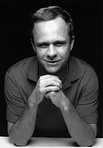Blake Bell's Blog, page 4
August 16, 2012
Muriel Kubert on Joe Kubert P2
 Yesterday, we published the first half of my 2002 interview with the late Muriel Kubert for my firsts book, "I Have To Live With This Guy!", on life with her husband, the recently departed Joe Kubert.
Yesterday, we published the first half of my 2002 interview with the late Muriel Kubert for my firsts book, "I Have To Live With This Guy!", on life with her husband, the recently departed Joe Kubert.Below is part two, including the follow-up questions and my interview with Joe about Muriel and her contributions to the family, to his career, and to their school for cartoonists. God bless them both. Few leave such a legacy, few have such an impact on so many in the business.
Muriel Kubert interview
P2: Thursday, March 7, 2002
BB: What is the experience like, to be able to first open that thing (the Kubert School)?
MK: Exciting. It's still exciting. You look around and you look in the comic books. Sometimes I'll take a look in the Buyer’s Guide - very rarely - and I'll see the names of our kids. It's really something. And we have international students too. There's one boy, that I used to call my Nigerian son, he's now the top political cartoonist in England. It's wild. It really is.
BB: So that first 22, do you remember all 22 of them?
MK: I don't know about all 22 of them. There was Rick Veitch. There was Steve Bissette. There was John Totleben, or did he come a little bit later?
BB: They all still hang together, the three you just mentioned. They all hit Swamp Thing at one point or another. They all traded off from each other. Are those some of the guys that stand out?
MK: Tom Yeates. I’m trying to remember the names. It's going back, what, 26 years?
BB: Once the school is open, what are you doing the school?
MK: I was there all day. Early in the morning until school closed, I think we closed at 4:30. I love to cook, but at that period of our lives, we opened up a charge account at the diner because I didn’t have time to cook.BB: So what are you doing all day? What's your day like at the school?
MK: Now?
BB: No, then.
MK: I often would handout the attendance sheets to the teachers because Joe hired some of the teachers, he didn't teach it all by himself.
BB: So you were the administrator?
MK: Oh yes. I had the art supplies in a cabinet. If a student needed something, I'd have it there. Now we have a whole, huge art store, open to the public.
BB: How about in getting instructors back then? With 22 students, how many instructors did you have?
MK: I know Ric Estrada. I don't know if he was there at the beginning or not. Hy Eisman was...Irwin Hasen, Tex Blaisdell, Dick Giordano and Lee Elias.
BB: Why were these people chosen?
MK: Joe knew them. None of them are teachers. They're professionals who teach. They don't have a background in education, otherwise they would be teaching something else. These are professional cartoonists that teach.
BB: Looking back, were they good teachers?
MK: The kids love them and they did very well. The graduates from the time are doing very well. So they must have been good teachers.
BB: How do you do it differently now than you didn't back then?
MK: Bigger. Now we're in a big building. We bought the old Dover high school. The building that we originally opened, the mansion I was telling about, is a full dormitory.
BB: You had those first 22 staying there at the school?
MK: I think a couple of them commuted, if I remember correctly. No, all 22 didn't stay.
BB: To have this huge dormitory, what percentage of people room there?
MK: I don't know - probably half.
BB: What's that like? Are you the “mother hen” over these guys?
MK: I don’t go into the school any more. I work out of the house. My daughter-in-law, Debbie Kubert, took over my spot. She runs the school. Of course, Joe is there every day and she works with Joe. But she's the director now and not me.
BB: When you were the director, were you “mother hen” to the guys in that first-class?
MK: Yes. Sometimes, when we first opened, I would bring in some homemade brownies or something like that. I guess you could call it a mother hen.
BB: Not that raising five kids isn’t an enormous job, but how about the demands on everybody's time when, all of a sudden, you're running a school together. Is it fun to be working together with your husband? A lot of people can't hack that.
MK: Yes. The only reason it worked was that he had his “balewick” and I had mine. He was in charge of anything to do with art because I wouldn't dream of imposing on anything about the art because I don't know anything about it. Mine was the business end of it and also, because I respected him as a businessman, we would confer on the business end. I did the bookkeeping and all of that. Then two years into it - you have to be established in it for two years before you can apply for accreditation -we applied for the accreditation, which is an unbelievable amount of work. It still is. The paperwork is horrendous, but it's worth it because it shows and indicates to parents and students that we are a legitimate school.
BB: Do you have to conform to certain standards to get this accreditation or how does that work? Is there anything that makes you say, “yes we want accreditation but I know about what they're asking here?”
MK: You have to adhere to their rules and regulations, otherwise you won’t get the accreditation. As I said, every five years now, we have to go through accreditation. You have to submit what they call an SER - evaluation report - which sometimes is a couple hundred pages. They “x-ray” you. They have team of educators who come to the school for one or two days and talk to students, talk to teachers, go through your files, everything. It’s the same as anything else, a hospital or anything else at that requires accreditation.
BB: How is Joe juggling still being an editor DC, with you guys still running the school and still doing artwork?
MK: At that point? He made the time. He's able to juggle and compartmentalize and he's fast. That's what they tell me anyway.
BB: Was 22 students enough to make a living off of the school?
MK: We always said that we're not like other schools. I've met other school owners. Some of them look at every student with a dollar sign over their heads. We didn't and we don't. We're independent because Joe makes a very good living without the school. We could afford to be independent. If a student didn't shape up, cut classes, failed, we'd kick him out. We still kick them out.
BB: Were there times there in the beginning, with only 22 students, that you were using income to supplement the school, to keep going? Was it able to pay for itself right from the start?
MK: I don't remember, but it probably paid for itself, but we didn't care. What's more important is the reputation of the school. I think we've achieved that. I think the reputation is top drawer because we don't hesitate to dismiss a student from the school if we don't think he belongs there.
BB: How many students do you have now?
MK: About 140, 150 - something like that.
BB: Is that the amount you guys want? Do you feel comfortable with that? Do you always feel like you have to open up more spaces because more people want to keep coming in?
MK: Joe won’t accept much more than 110 students at all. We don't want a university. We want quality, instead of quantity.
BB: What was it like for some of those students, given that Joe would put some of those students on his material right off the bat? In terms of guys coming from the school, he's working in DC and is able to lead these guys right into the industry.
MK: If they had the ability. Or they would go out knowing the names, etc, they would go and obtain the jobs themselves.
BB: You didn't just offer just an education in drawing but also in the-
MK: We offer business-related courses, if you could call it that.
BB: In terms of how to break into the comic industry or in terms of other industries related to art?
MK: In terms of copyrights and legalities and contracts. However, Joe tells the students at every graduation, “don't forget about us.” He means it. He has them coming in during summer, or any time, to help them go over their portfolio, make sure the portfolio is suited for the position from which they are applying. We don't forget about our students.
BB: What has Joe gotten from the school? What does he take pride in especially?
MK: You'd have to ask him.
BB: But you can see it in him.
MK: He's proud of the alumni. It gets aggravating when you see a kid who professes he wants to come to the school, then during the first year he cuts classes and doesn't do his homework, etc. That bothers you. Especially when Daddy is paying bills. Thank God those are few and far between.
BB: Whose idea was that to do correspondents courses?
MK: I think it was both of us.
BB: Has that worked out well?
MK: Yes, it's working out very well. It’s building and it's constant. What's so interesting is we have correspondence school kids from all over the world - Singapore and Malaysia and South Africa. It's amazing.
BB: Did you worry that this wasn’t going to work, having them way out, potentially, on the other side of the planet? What were some of the worries involved in setting up that?
MK: I was just worried about the mail getting through there. With some of these South American countries, there is a problem with the mail, but we've overcome that by sending it with express mail or something like that. I think just a couple of packages of the lost in the couple of years that we've had the school, but it's not too bad.
BB: Would you guys mail a lot of artwork during the '50s and '60s to DC? Were there any episodes where you mailed something out and it just disappeared?
MK: There wasn't FedEx at that time. Either you get a messenger to bring it in or you would bring it in yourself.
BB: So there were no stories where a whole story flew the coop?
MK: Not at that time. We’re thankful today for faxes and FedEx and UPS.
BB: He's had such a great career over the years and has been so well regarded but was there any hitches or disappointments in his career that he's had to whether that you guys remember?
MK: I don't think so. I think he's been very fortunate, very lucky and whatever he's attempted has worked that I can remember.
BB: And now he's got the two sons who are at the peak of the industry.
MK: We are so proud of that.
BB: Did they ever feel pressured to enter the school?
MK: No, they told us they wanted to. You're talking about enrolling in the school? They told us. Adam, after he graduated RIT, said he wanted to be a cartoonist and he wanted to come to the school. And Andy, after he left RIT, said he wanted to. We didn't pressure them. In fact, we tried making it harder for them. We told them, “look, you're Joe Kubert's children. You have to be better as far as attendance and getting everything done on time. You've got to be better than the other ones.” We can't play favorites, and we didn’t.
BB: Was there resistance to them being in the school from other students?
MK: I wouldn't think so because they're still friends with a lot of the guys.
BB: In terms of them entering the industry, was that help or hindrance having a father already in there?
MK: I can't speak for that, however, I feel that the name helped. If you don't have the goods, the follow-through, the name won't do any good.
BB: Virginia Romita said about John Jr. there was some resistance when he started out. What about a sibling rivalry between two? Are they best buddies?
MK: Oh they're wonderful. They work together. They ask each other questions. One will ask the other one to look at his work. There isn't any rivalry.
BB: How about healthy competition?
MK: I don't even know if it's competition. It's just, “I'm glad the you're doing this work and I'm doing that work.” They get along beautifully.
BB: If I mention Robert Kanigher, what does that bring to mind? How often would you have met him?
MK: (Just once, I think.) Very talented fellow - very talented. I really don't know anything more about him. His personality was very strong. He did teach at the school way back when.
BB: Who was the best teacher was at the school?
MK: Joe.
BB: Okay, besides Joe. Can you look back and go that guy really out well or the students really raved about that teacher?
MK: We have a couple that are really good. I don't want to point one out over another. I'm talking about the current ones. We’ve kept some of them for a very long period of time. Hy’s still working for us. Irwin is still commuting from New York to come out.
BB: How often do those two guys come out?
MK: I think once or twice a week, I'm not sure.
BB: Back in the beginning, everyone else's having to earn a living on top of this as well, but they're still able to dedicate some time?
MK: Right, they get paid for it too.
BB: They must love it.
MK: They must. I've never asked but they must.
BB: Did you ever meet Russ Heath?
MK: Yes, in fact, in our first house, when we lived in Parsippany, I remember him coming over with his wife and he had couple of kids at that time. Yeah, I remember Russ - a very, very talented man.
BB: What was his personality?
MK: Very quiet, laid-back, very thorough, very interested in what he was doing. I remember when he was doing something, he would research it to the Nth degree.
BB: Him and John Severin really seem to have that competition between themselves. Did you ever meet John?
MK: Once when we drove out West. We traveled quite a bit with the kids in the summertime and once we stopped at John Severin house in Wyoming. Maybe it was in Colorado. And I remember having dinner there out on their patio. He’s a very lovely man and his wife was lovely.
BB: Was he a quiet guy, a gruff guy?
MK: As far as spending an hour with him, he and Joe talked and I listened.
BB: How about Carmine Infantino?
MK: We’ve known Carmine for a long time. He was an usher at our wedding. He was one of the first cartoonists that Joe introduced me to before we were even married.
BB: So you've known him quite a long time? What was the like way back then?
MK: Very nice and very sweet. Same as he is now. I haven't seen him in years, but I've talked to him on the phone. Very nice
BB: Did you ever get to meet her when Irwin Donenfeld? He may have been gone around the same year Joe became editor.
MK: No, I never met him.
BB: A lot of these people, you’d meet sporadically.
MK: Correct.
BB: Do you and Joe go to a lot of conventions?
MK: No, not really. Invited to a lot of them, but it takes a lot of time to go and he really doesn't have that much time and we've gone to San Diego a couple of times. I think he went to Chicago once. We've gone to South America and European conventions a few times. It's interesting.
BB: Where are his energies today, going into the school?
MK: Part of it goes into the school and much of it goes into his other projects.
BB: So he still works a healthy 8 to 12 hour day; the same as he always worked in the '50s and onwards?
MK: Well, he's at the school 8:00 every morning until 5:30 or 6:00 at night, Monday through Friday; sometimes Saturdays and Sundays.
BB: Is that a need in him, to keep working?
MK: He loves it. He thrives on it.
BB: He and Will sound a lot like from what I hear.
MK: We just came back from a Caribbean vacation for two weeks. He takes his work with him and does it every morning. He will never retire and neither will I.
BB: Everything is the same as it was beforehand in terms of being busy; he's on the ACTOR disbursement committee? ACTOR, the associative they put together to help out comic book artists who are not doing so well financially.
MK: I think Joe did contribute some artwork to that, if I'm not mistaken. I'm really not familiar with it.
BB: The school has grown to such a large degree. Is that the primary income for the family?
MK: No.
BB: It still comes from Joe's work?
MK: Absolutely.
BB: What about pensions and health coverage? In talking to a lot of comic book artists, a lot of them don't come up with that.
MK: We do offer to our instructors a pension and profit sharing plan. They don't contribute - we do it. We do have health insurance, so we're real proud of that. We treat the instructors like we would like to be treated.
BB: What's the effect of September 11th on Joe? I know he contributed to the-
MK: He did. He contributed to both Marvel's and D.C.
BB: Do you remember that day, in terms of the effect it had on both you and Joe?
MK: I was sitting here by myself watching TV waiting for somebody. We watched the first plane, no this was after the first plane and then the second plane hit. I think it was MSNBC I was watching, they had to play back the tape to make sure. I couldn't work the rest of the day. I was glued to the television, I'm sure like everybody else. It was a horror.
BB: And Joe was at the school at the time?
MK: Yes.
BB: When you're married to an artist what kind of effect does that have on an artist? Are they more sensitive to those kinds of events? Does he come home shaken?
MK: No. I don't think so. Shaken? No. Very upset as we all were - it's only natural - that something like that could happen here.
BB: He contributed to both books?
MK: Yeah, beautiful work. They each called him.
BB: Because he's one of the few that contributed to both.
MK: Is that true?
BB: I don't know how many did, but I certainly remember Joe having done both. There are no company lines when something like that happens. It's great to see everybody bonding together in that regard.
MK: Absolutely. I mean, what else can you do? It's frightening, it really is.
BB: Were do you see the school going into future? Are you happy with the size right now?
MK: Yes, I don't want to get it out of control. When you lose contact with what's going on, it's no good. You'll have another Enron. You have to have hands-on. It's our name that's on the school. It's our reputation and our children's reputation.
BB: So you don't see a Kubert school starting in L.A.?
MK: We've had offers about franchising in France, a franchise in California. No, you can't maintain control. You see some companies that grow too big and they just fall by the wayside.
BB: How do you keep up the energy level in that type of thing. How do you keep it from not going stale?
MK: Well, when you're dealing with people all the time with different wants and different needs, it’s self-fulfilling. You just keep up with it and the industry does change a bit. It’s interesting.
BB: Obviously, the industry is a very interesting place these days in terms of declining sales. Have you felt that impact at the school?
MK: No, not really. Where I meant the industry was changing was with the use of computers, which is becoming more prolific.
BB: How does Joe feel about that? How you feel about that? When Joe started teaching back in the '70s, it was obviously hands-on paper, or pen on paper. Do feel pressured to adapt to computers. How do you guys handle that?
MK: I think you have to maintain a balance. They still have to know the basics: how to letter and colour - for example - but they also have to know all that on the computer. We’re getting more and more computers every year because it was something that was needed.
BB: But when a student comes in and applies to the Kubert school, they're applying as a comic book artist and they can they can take other courses like computer animation and other things. The primary focus will still always be pen on paper?
MK: You haven't seen our catalog, have you?
BB: I've seen the web site.
MK: Our courses are listed on the web site. But when a student comes into the school of first-year student they're required - it's quite different than any other school - to take ten different courses of week. Then, after they successfully complete the first-year, they can go into either animation or cartooning. That's what they choose and they have to be accepted into animation. Not everyone is excepted into it. There are still ten courses, no matter which major in which they enroll. The third year is also ten courses. In the ten courses, they also get quite a bit of homework. By the time they graduate, they really have a good background in either one of the courses. How did you like the web site?
BB: Very nice, very colorful, informative. You do research for something like this hope and you can find everything you can find. I had no complaints.
MK: We've worked really hard on it and were still working on it. That's my baby.
BB: Is that the thing you've taken over in terms of creating?
MK: Well, I didn’t created it. I didn't actually do it.
BB: That is your baby? You're always actively trying to find-
MK: Different things to do on it.
BB: What's your focus now in life in general?
MK: I can hook up to the school computer, so I can do some of the bookkeeping on it. I do the annual report for accreditation. I do the annual report for the New Jersey Department of Education and all of the bookkeeping for Tell-A-Graphics – our art agency - and all the bookkeeping for the correspondence school, so that keeps me busy.
BB: What's about the discipline and the mental makeup of artists now versus the artists of Joe's generation? What are the similarities and the differences that you've noticed? Are you exposed to enough artists?
MK: No, I'm not. I can't answer that.
BB: In the future, has Adam and Andy expressed interest in running the school at some point?
MK: This year they did become involved in the school. I don't know if you saw our ad. They are teaching now this year. They're becoming more active and they're learning what goes on at the school. We’re actually quite surprised and pleased that they enjoyed it so much. They really come forth with suggestions. As a parent, it's very pleasing to hear.
BB: You see them in the future taking a more active role in the school? Keep the legacy going?
MK: I hope so.
BB: You have grandkids from them?
MK: I have 11 grandchildren. May I brag? Our first one graduated law school, passed the New York and New Jersey bar the first time he took it, and just obtained a great job with a law firm in New Jersey.
BB: What's the deal with New Jersey? You've lived they're almost your entire marriage?
MK: Lived there all my life. What you mean? What is the deal with New Jersey?
BB: It's so close to Manhattan and yet every impression that I have is it is the exact opposite of Manhattan.
MK: We have everything. We have shore, we have mountains, we have skiing...
BB: What would you say are the differences between a Manhattan person and a New Jersey person; you being a Jersey person yourself?
MK: Slower.
BB: You mean slower, as in terms of pace of life? I wanted to clear that up. What's the one thing that would surprise us about Joe? What's the thing when people read this the people say I honestly wouldn't have expected that from Joe?
MK: I wouldn't tell you. (laughter)
BB: Okay, what's the one thing you couldtell me about? What's the most misunderstood thing about Joe?
MK: Well, I don't know what people think of him. I think what you see is what you get. He's the most straightforward, honest, and sincere person. He enjoys people. What else can I say about him?
BB: What about the Internet that is your baby? Do you do a lot of e-mail yourself?
MK: I help the person that the answers the e-mail questions. What she can't answer, or might have difficulty with, I help her with the answers until she learns.
BB: Is Joe interested in the Internet and all that?
MK: Not really.
BB: Is he a computer guy at all?
MK: He understands the basics, but he doesn't like it.
BB: Why is that? Is it because it's unnatural; he's such a hands-on individual with his art?
MK: I think he just doesn't like the technology of it. I have embraced it. I love it. I'm an information junkie and I'm constantly amazed by the amount of information. Whatever you're looking for, with enough patience, you can find...if it works.
Before we close, may I thank you for this opportunity to express some of my thoughts. This is the first time I have ever been interviewed and I must admit I enjoyed it. It has been a pleasure to talk to someone who is as well versed as you are in the business that has encompassed a major portion of my life. And, may I mention our web address? It is www.kubertsworld.com or just www.joekubert.com. At that address, one may find information on our full-time school, THE JOE KUBERT SCHOOL OF CARTOON AND GRAPHIC ART INC.; on our correspondence school, KUBERT’S WORLD OF CARTOONING; on our art store, JOE KUBERT’S ART AND GRAPHIC SUPPLY or CARTOONIST SUPPLY DEPOT; and our art agency, TELL-A-GRAPHICS. The email address for all is kubert@intrepid.net (we’ll forward it to the proper entity).
Muriel Kubert: Follow-Up Questionstaped June 5, 2002, by phone from New Jersey
BB: Is there a specific event where you knew your sons have achieved that reputations for being top of the line professionals?
MK: One thing I can think of is when they started getting e-mail fan letters – then I knew. I would get them and forward them onto Andy and Adam.
BB: Is there a specific story about the grueling deadlines of syndicated strips, or tales of the GREEN BERET strip?
MK: I know that if we were going away on vacation, Joe would always have to drop the strip off in New York. I just remember that the deadlines were grueling.
BB: You say, "My husband and Will Eisner are the two best cartoonist businessmen I've ever met."
MK: I think it’s innate. He never studied accounting, marketing or advertising like I have, but he’s sharp as a tack when it comes to that.
BB: Is there a funny story about Joe and his not liking computer technology?
MK: He appreciates the capability of what a computer can do. He knows sometimes you can’t live without them, but sometimes you can’t live with them. He’s so use to his own way of doing things that he doesn’t see any need for it in his balewick. He knew that it was necessary for the students at the school to learn.
BB: How Joe does reacted to the things he sees? By that I mean examples of how he reacts to certain movies or music, or what he read for his own entertainment? Did he take a sketchbook when they went to the park? Any stories about this? I'm just trying to get at what you view as the things that inspire Joe?
MK: Whenever we travel any place, he takes a sketchbook with him. He has a good few of them and they are beautiful - museums in Paris, in London and New York. In fact, one of these days, we’re going to publish his sketchbooks.
BB: What is the function of the sketchbook for him?
MK: It relaxes him. He tells me, and I think he’s right, that it is better than a camera, as far as remembering a specific spot where you were in a different country. He really gets all the details where a camera just takes a photograph and doesn’t have the heart that Joe’s sketches do.
BB: What would he be sketching?
MK: He would sketch statues. He has a couple of Michelangelo’s David. He’s got some he’s done from the shores of Spain. He’s got three or four sketchbooks filled with what he’s seen.
BB: When he pulls out the sketchbook, what do you do?
MK: Very interesting! I have learned over the years that when we go some place, I take a book with me. They always have benches around, so I’ll sit around and read while he’s drawing, or go to other rooms in a museum – not enough to get lost, of course.
BB: Did he ever share with you what inspired him to become an artist in the first place?
MK: I think that’s innate, as well. Nobody in his family is an artist. He just used to draw on the sidewalks of Brooklyn with chalk, or he would draw on the paper bags from stores. He just drew constantly from the time he was old enough to hold a pencil. If you knew the spark, you could produce more of them.
BB: Does Joe play music in his studio? What kind of music does he listen to?
MK: When he has to concentrate on something; yes. He plays classical, Sinatra, some Jazz - anything but rock’n’roll.
BB: When you say “he has to concentrate,” does that mean he’s using the music to block out his surroundings?
MK: Yes, we’re both talk radio freaks. I love it, and I learned about it from Joe, but when he’s concentrating, he has to have the music – he can’t have talk radio on. He can’t concentrate on that and the work at the same time.
BB: What is it about talk radio that had you both interested?
MK: I’m an information junkie. I rarely watch television. I read or listen to talk radio. When we were first married, they didn’t have much talk radio, but they had soap operas, like Philadalls, and he would listen to them. I learned to listen to them, too. I found out I liked it.
BB: Is there one cute story about Joe's fans? A specific story about a fan of Joe's that "warmed his heart"? Do you remember a specific fan letter that Joe treasured and did he tell you why he treasured it?
MK: There is a policeman in New York that works on the boats that go around doing scuba diving for bodies. He’s been writing to Joe for about four or five years. He’s a fan of Sgt. Rock and Joe would answer him – four or five times he would write. This fellow was very active in the World Trade Centre and he came out to see Joe for the first time a couple of weeks ago, brought his three kids, and Joe felt it was very heart-warming. It was probably the sincerity in the letter. They’ve had an on-going, sporadic communication. Another man sent an e-mail that Sgt. Rock saved his life. His mother was a German Nazi. They lived here in this country and she was trying to indoctrinate her son into Nazism. He said he was going crazy with her to the point where he would run off into the woods, when he was a young kid, trying to get her out of his system. Then he read one of the Sgt. Rock stories and he saw what Sgt. Rock thought and he realized that it is all psychological and that he’s not going to let it affect him. Now, he says he just wrote a book on his childhood experiences. He’s got the manuscript – he doesn’t have a publisher or anything.
BB: You said you are an extremely private person. What is the genesis of that?
MK: It’s just in me, as far back as I can remember. I’m not a gossip. I don’t talk about anybody else. My kids know if they tell me something – “Mom, please don’t say anything” – I never talk from one kid to another. I feel my life is my own business, especially in a book where I don’t know who’s reading it.
Questions for Joe Kuberttaped June 10, 2002, by phone from New Jersey
BB: First impressions of Muriel from that Bradley Beach summer house in 1950?
JK: You’ll find me a little less private than Muriel (laughter). She’s very much a person who likes to keep things to herself, and not the kind to spout off, which I guess is one of the reasons I married her. The first thing that struck, candidly speaking, was how pretty she was. She was quiet, reserved, and a tall lady about 5’ 10” with dark hair. She was, and is, very attractive. She wasn’t really outgoing, she was a private person, not one to be making jokes all the time, a little conservative.
BB: So you did the pursuing?
JK: Absolutely.
BB: Is she right that she had involvement in your work & career choices? Did she help you at all?
JK: That’s not necessarily true. As a matter of fact, I value her opinions greatly. She has an artistic bent, although not in art or drawing the things that I do, but I find it very valuable for me. The majority of the people who see the material that I do are not artists in and of themselves, so speaking to someone who is less inclined to give an artistic opinion, or who has art as a background but more reflective of the general public, I felt was of extreme value to me. She has a very high emotional response. By that I mean that she feels very much for people and things, so that when I did the Sarajevo book, she was very much taken by that. First of all, she knew the people involved. Second, it was like reliving a lot of the stuff she was directly involved in. She was the person who maintained all the correspondences, all the faxes. She was the one who kept writing to Ervin. I would read and check everything that was going out, but she was doing all the physical work, and it was a hell of a lot of physical work. She was clipping out newspapers and reading every article she could that might be helpful to him. So, the result of having all those faxes that we had collected, I think primarily was her doing.
BB: She said you could leave the emotions of a war story, for example, on the drawing table.
JK: That’s pretty much the way it was. She doesn’t have any real deep interest in comic books, per say, but there were things I had done like the Fax book and Abraham Stone, things where I had written the stuff (as opposed to having illustrated someone else’s writing), I think I made a point of showing it to her. Her reaction and judgment was very valued by me. I have the same kind of relationship with my sons. They will show me their work and I will show them mine, just for reaction and so on. That doesn’t mean our reactions or suggestions are things they have to take up. It’s just having an opportunity to see another option or another side to what you are doing that you hadn’t seen before. Muriel has looked at the stuff and she checks it over, and I appreciate her value and judgment, but it doesn’t necessarily mean that if she makes a suggestion, that I’m going to slavishly follow it.
BB: Stories about how she helped and influenced the careers of Andy and Adam?
JK: Well, she’s the one who really extends herself in every which way to make sure every opportunity comes their way and that perhaps they take advantage of it. She’s very family-oriented and the kids and the grandchildren are probably some of the most important facets of her life. She’s very giving, all most too much so. Her mentioning “Kubert and Sons” is an indication of where her thinking lies. The possibility of that was remote at best to have enough interest to do this kind of work, and second to get involved in the school, I never really gave it much serious consideration because there are too many things that can happen, so to bank on something like that would seem a little bit precarious, if not just silly. Adam, at the age of eleven or twelve, was lettering not only for me, but for other comics as well. Muriel would absolutely encourage them, but with young people they may elicit an interest when they are eleven and twelve, but by the time they are thirteen, the interest has disappeared. Muriel certainly encouraged them every way she could. I wasn’t conscious or aware of them living in my shadow. John Romita probably had more insight on the situation than I with my sons. I can tell you an incident that did bug the hell out of me. Very often, the kids would be drawing in my studio while I was working. Andy was at the age of 9 or 10, and he was really labouring on a particular drawing that just didn’t work out. He brought it over to me and asked him if I would help him with it. I was intent and intense in the job that I was working on, and when he showed me the stuff, I said, “Sure!” and made the correction very quickly. But when I did the correction, Andy stopped in his tracks, looked at me, looked at his drawing, threw the drawing away and for years after that, didn’t pick up a pencil to draw again. It’s only later that I realized what I had done. Here the kid was slaving over the drawing for at least an hour, and couldn’t get it to look right. Here I picked it up and in a matter of a minute was able to make a correction. I only realized later that his thoughts were, “gee, if it took me so long to try to correct the drawing, and I wasn’t able to do it, and he did it in a second, I’ll never be able to do it.” So, he decided he didn’t want to pursue it. It was only years later that he came back to do the drawing. He kept it in himself, until he had gone back into drawing and we talked about that. I had no idea that my doing the correction so quickly, without talking to him about it, how it would affect him.
BB: Your business skills – Muriel calls it “innate” but where did you get that from?
JK: I wouldn’t pretend to make any comparison with Will. He is absolutely exceptional. I would figure it a matter of luck. I’m not a gambler. I don’t play cards and I’ve never shot craps. In fact, we’ve gone to Las Vegas a couple of times and I’d walk in not even knowing what the hell was going on, but I do gamble in business. I try to make an evaluation of what the worst downside would be, and what the opportunities might be if I pursued it. On that basis, I make the decision. Beyond that, really Blake, it is purely a matter of luck. My parents were, I feel, tremendously brave. They came to a new country, travelling 5,000 miles where their parents were doing well, where they could have made a living. My father decided, for the opportunities that the new country America presented to his children, he wanted to leave. He picked up his wife and two kids.My father was a kosher butcher most of his life, but during World War II, he decided he wanted to be a welder. Here’s a guy in his fifties having never done this kind of work at all, even though he was extremely handy, having the guts to ahead and do this. He learned how, despite the language barriers and having not done it before, and he became a terrific welder. I think they are where it came from. They had the guts to do anything they wanted to do, or felt they could handle.
BB: Why did you respond to that policeman’s letters?
JK: I tried to respond to all my letters. If anybody’s going to take the time, especially one that had the kind of feeling that this guy had, I try to make it my business to respond to all of them. I have responded to a good number of letters that others might feel are innocuous. I feel almost compelled to do that in a lot of cases. This was a guy that sounded interesting. I found him very nice and he didn’t make a pest of himself. His letters came maybe three or four a year. Every once and awhile it was nice hearing from the guy.
BB: Did the family take any backlash from the Comics Code?
JK: In most cases anybody who was in the art field looked very much down on anybody who did comic book work. With Will, it was a syndicated strip, and that took it out of the realm of comic books. I never felt this, but it was only years later that I learned a lot of the guys never mentioned that they did comic books. They would say I am a commercial artist or I do advertising. At the time of the Kefauver meetings, a lot of businesses closed up and a lot of artists were out of work, but as far as I was concerned, I started drawing at a very young age, and I don’t think I’ve had a day of unemployment. Even when I was in the Army I haven’t in all the years I’ve been in this business.
BB: Were you highly motivated to get out of freelancing?
JK: No, I won’t ever stop drawing. If I wasn’t getting paid for it I’d still be drawing. It’s not something that I liketo do, it’s something that I have to do. I always felt that if I couldn’t make a living drawing, there are a hundred other things that I could do to make a living. Being out of a job doing cartoons never frightened me, never scared me in the least. One of the big advantages of drawing when we’re out is now only the opportunity to draw, but I’m able to retain the details of the things I’ve seen when I draw them than if I take a photograph of them.
August 15, 2012
Muriel Kubert on Joe Kubert P1
 Muriel Kubert passed away in 2008 after 57 years of marriage to her husband, Joe Kubert, who has now joined her in Heaven. I had the distinction pleasuring of having Muriel and Joe participate in my first book, "I Have To Live With This Guy!", back in 2002. She was a strong woman, knew her business, was protective of her family and their legacy (five children; two, Adam and Andy, important artists in their own right), and an integral part of the Kubert School that has produced many great cartoonists during its now 36+ years in business.
Muriel Kubert passed away in 2008 after 57 years of marriage to her husband, Joe Kubert, who has now joined her in Heaven. I had the distinction pleasuring of having Muriel and Joe participate in my first book, "I Have To Live With This Guy!", back in 2002. She was a strong woman, knew her business, was protective of her family and their legacy (five children; two, Adam and Andy, important artists in their own right), and an integral part of the Kubert School that has produced many great cartoonists during its now 36+ years in business.In my book, I combined the Kuberts in a chapter with Stan & Joanie Lee, as well as Will and Ann Eisner. All three were examples of men, and families, who broke the mold, in terms of finding success in the industry that was accomplished beyond the pen. All three men were good businessmen, and good salesmen.
Originally, my book was going to be nothing but interviews, but I wanted to provide more context, so I went the prose route. So, here, for the first time, is the entirety of the Muriel Kubert transcript (edited afterwards by her), in two parts. We'll publish part two tomorrow night, which includes the follow-up questions and my interview with Joe about his wife and her importance in his business and their family (read onwards after the jump break).
Muriel Kubert interview
by phone from New Jersey
for “I Have To Live With This Guy!”
Blake Bell: I'm speaking to Muriel Kubert on Thursday, March 7th, 2002. Muriel, I was wondering if you could tell me a little bit about your background; your family background; where you grew up.
Muriel Kubert: I grew up in New Jersey; a small town, Towaco, New Jersey.
BB: Now, when you say small, how small?
MK: At that time, maybe five thousand people. My dad had a small supermarket there – Fogelson’s Super Market. I went to Booton High. I went to Rider College after that. Got a B.S. in business administration. BB: When you were in high school, did you ever dabble in art yourself?
MK: No, I'm not an artist.
BB: Never dabbled never did anything?
MK: I took art as an easy elective.
BB: What kind of pop culture influences did you have back in those days? Did you like movies, were you into any kind of fine arts or movies or music?
MK: No, nothing special. I liked music: Glenn Miller, Frank Sinatra. But movies, not too much, no.
BB: Who had the biggest impact on you growing up? Was it father, mother, another family member?
MK: Probably my parents. We had a very close relationship. I have a sister and a brother. I'm the oldest. Still am.
BB: Looking back on it, what was the main thing you got from your parents, in terms of molding you into who you are today?
MK: My father's expression was - my sister's going to get a kick out of reading this – “get at it and get it done.” To this day, when I have something to do, I put everything else aside and I have to do it. Even a call, from anybody, wouldn't pull me away.
BB: It's nice to have that kind of discipline. It's a valuable trait. You went and got a B.A...?
MK: It was a B.S.; Business and Sciences-
BB: In Business administration?
MK: Correct.
BB: You aimed for that going through high school? How did you go into that?
MK: As matter of fact, in high school, I took a commercial course. In my junior year, I decided I wanted to go to college. I didn't have enough math. I think it was in my senior year I took algebra one with all the freshman in order to make sure I had enough credits to get into college. And it worked.
BB: Were you - I don't know the exact frame of reference, time wise, when you were going to high school - alone in that? I know a lot of woman from that era might have just gone into secretarial college.
MK: It was my decision. I was very young when I graduated high school. I was sixteen. I decided at that time - no one influenced me. As a matter of fact, I think my mother, at that time, was visiting with her parents down in Florida for a couple of weeks, and that's when I told my dad that I was going to try and get into college.
BB: Why business administration? What attracted you to that?
MK: I always liked business. Taking the commercial course in high school, I loved typing and shorthand and bookkeeping and Spanish. I've had five years of Spanish and I enjoyed it.
BB: Are we talking, you go into college in the forties, the fifties?
MK: I went to college in the late forties.
BB: What did you learn in college that you've been able to apply?
MK: Mainly, the bookkeeping, the accounting and also the Spanish. Of course I've forgotten a lot of it since then.
BB: Did you meet any resistance, being a woman talking business administration?
MK: There were a lot of women in my classes.
BB: May I ask when you first met Joe? And when that was, and the circumstances surrounding it?
MK: I first met Joe in the summer of 1950. His mother rented a rooming house for the summer at an area on the Jersey shore called Bradley Beach. My girlfriend - a sorority sister of mine - her mother, in turn, rented a room from Joe’s mother. I went there with my girlfriend to visit for a weekend and Joe was there visiting his mother. That's how we met.
BB: What were you very first impressions of the man? Do you remember your very first impressions?
MK: A nice guy - just a nice guy.
BB: What kind of personality did he have at that time? Was he overly funny? Was he quiet gentleman? I've never met that man myself so...
MK: You haven’t? You’re missing something. He's a very unusual guy. He was quiet. He was friendly. He was warm. He was sincere. He was honest - just as he is today.
BB: Was there an instant attraction or was there something that built?
MK: He took my girlfriend and I out at the same time that night. And then I went back to Towaco and he came up to see me. I believe it was at that point, he had received his draft notice and he was going into the army.
BB: Did that interrupt that courtship?
MK: No, not really, because Rider College was in Trenton at that time. Now it's moved to Lawrenceville, but it was in the city of Trenton at that time. Joe was stationed in Fort Dix. I don't know how far that was, but they're very close. In fact, sometimes he would go AWOL to come over and see me, so it didn't interrupt. As a matter of fact, I never went out with anyone else after I met him.
BB: How long was the courtship?
MK: Well, I met him in the summer of ‘50. We got engaged, I think it must have been around Christmas time, and got married the following July. I had completed college early, graduating in March. We were married in July.
BB: What were your impressions of what he did for a career? Do you remember first time upon hearing...?
MK: Well, there was a cartoonist in our town, whom I really didn't know. I remember his name was Colen Allen. I don't remember exactly what he did but that was my only experience of knowing a cartoonist. It was interesting to me. As a matter of fact, sometimes Joe would lend me his car and I would drive his work into New York for him and deliver it to D.C. Comics.
BB: This was before you were married?
MK: Yes, while I was still in college.
BB: What did your parents have think about, you know, daughter's involved with a comic book artist?
MK: They said it was just something different. They accepted him. They liked him very much.
BB: Oh, they did right off the bat?
MK: Yes.
BB: As a career, the career choice was not an issue at all?
MK: Not at all.
BB: Had you read any comics growing up or anything in that regard?
MK: Mainly, the girl comics. Fritzy Ritz, I remember; maybe Wonder Woman; The Journal American. Do you remember that strip?
BB: Sure, definitely.
MK: I used to read that one everyday. But comic books...I think I read Archie; mainly the feminine ones.
BB: In terms of, your impressions of comic books after meeting him, did you get exposed right away to a lot of his work?
MK: I wasn't really that involved with his work, no. I mean, I looked at it. It looked good to me. To tell you the truth, to this day, I really don't read comic books. I've read Fax From Sarajevo. I've read a couple of others, a couple of Sgt. Rocks, but I really haven't read a lot of comic books.
BB: So, his work, I'm assuming, would come to the house or would he get his work, in terms of the published work itself? Would it come to the house? Would he get it at the office, when he was working as an editor?
MK: He probably brought some back from the office. That I don't remember.
BB: Okay that’s interesting. I was going to ask what would strike you about his style from back then but...
MK: No, don’t ask me.
BB: Okay, I will stay away-
MK: All I know is I love his work.
BB: Okay, Now am I to understand, he was born in Poland originally and came over quite young?
MK: Two months old.
BB: When he was drafted into the military, when he received his draft papers, he must have had family in Poland. Did he have any family that lived through the holocaust?
MK: Oh, he lost family in the holocaust. As a matter of fact, when his mother was pregnant with Joe, they tried to come over but they wouldn't allow her on the boat. So, they had to go back to the town that they came from and wait for the birth to occur. That's why they came when Joe was two months old.
BB: Was that a prevalent force in his life from the time you first met him, about his history and him knowing his history?
MK: No, not necessarily.
BB: All the sudden he's drafted to go into Korea. What effect does that have on him? He did actually spend some time, I believe, in Germany?
MK: Yes, yes. He's very lucky and that's why I tell who ever draws to keep on drawing in case there's another war. While we were married, he, of course, was in the army. After basic training, he was permanent personnel in Fort Dix, New Jersey. We rented an apartment in Princeton. Joe would commute from Fort Dix to Princeton. Because of his ability to draw, he was assigned to Special Services. He did a strip in the Fort Dix Post newspaper called the New Recruit. He painted helmets and signs, whatever else they needed. He stayed at Fort Dix, I think, for about a year and a half. He was due to come out after two years and then, in the last six months, they shipped him over to Germany.
BB: That must have had quite an impact on the family. I can't even imagine. I'm 31 years old and calling from Canada so I've never had to experience the notion of sending away somebody I love and you don't know where they're coming-
MK: Most of his company went to Korea. And a lot of them were killed in Korea.
BB: You have people with Survivors Guilt or people who think, “gee, I didn't get sent over.” Would he view himself as lucky, or did that have kind of a haunting effect, that members of his company-
MK: He kept in touch with some of the men he took basic with, but I think he just appreciated the luck.
BB: Exactly. So, he comes back from Korea and he starts working at St. John and creating Tor. How involved are you in the notion of his work and what's happening?
MK: Not at all.
BB: That's interesting, because Ann Eisner said the same thing about Will. He would go to work and it was a job and he would come home and she had no - I don't want to say clue per say - but it was just a job and she was not really cognizant of The Spirit and those types of things going on.
MK: Same thing, except Joe didn't go to job. We built the house in Parsippany, New Jersey when he was discharged. The basement was made into a studio and he would go downstairs to work. And then we started having children.
BB: During that time, how about the demands on his time as being a freelance artist at that time, I guess working for St John and DC at that time. What about the demands on his time compared to a normal 9 to 5 job?
MK: He was always able to juggle his time. Sometimes he would pull some all nighters. But if I needed him for something, if I needed to run someplace and needed someone to watch the baby for awhile, he could stop what he was doing and do it.
BB: Was he an early riser, in terms of starting work?
MK: Sometimes…sometimes, not all the time. Depends on how late he went to bed.
BB: So he would work, like after dinner he would keep working?
MK: Yes. It depended on what we were doing, his schedule or what was on television.
BB: And what's the worst situation like back then? Do you remember financial hardship? Or would he be able to earn enough money as a freelance artist, and connections to St. Johns, to make a healthy living at that time?
MK: I don't know about “healthy” but we were able to maintain a house. We had children and I was fortunate enough that I didn't have to go to work.
BB: You were able to stay home and raise the kids?
MK: Right.
BB: And the first kid was David. And what year was he born, if I might ask?
MK: 1953.
BB: So, right after the war. What effect does that have, entering a child into a homestead, on an artist actually working in the home? He's able to find time-
MK: Wonderful. Wonderful life, I encourage anybody for it. It's a wonderful life.
BB: Is he able to work with distractions around him or does he need to be locked away?
MK: He had his studio. We knew when the door was close, you don't go downstairs. And he was able to work. The beauty of being a freelance artist, and of working at home, is that you can take your work with you. We would go on vacation and he would take his work with him. Not that he always did it. Sometimes he did. Some times he didn't.
BB: So there were no issues, about all the sudden he's taking his work on vacation. Were you ever like, “Joe, leave the work at home, let's go!”
MK: None at all.
BB: He was able to maintain that balance? Were you aware of the Comics Code Authority at the time and the big hubbub about comics?
MK: No.
BB: You never ran into anybody who said, “oh geez, your husband’s into comics? Aren't there people on the news saying bad things about comics and all those senate hearings about comics?” Were you cognizant of that going on at that time?
MK: Not really aware of it. I mean, I'd follow the news but it wasn’t the most important thing on my mind. At that point in our lives, I really didn't know many cartoonists. We didn't belong to the Cartoonists Society at that time. I really didn't know anybody else in the field, except Joe's friend, Norman Maurer, son-in-law of Moe Howard. That's the only one I knew.
BB: Did you ever get to meet any of the Three Stooges? Did you meet Moe Howard?
MK: I met Moe. In fact, when Joe returned home from overseas, we took a trip out to California and visited with Norman and his wife, in addition to having dinner at Moe Howard's house. I was so excited. My god, a movie star.
BB: What was Moe like in person?
MK: Very nice, very charming, and very warm.
BB: Different than he was in the movies or could you see that?
MK: I don't know. I didn't see any goings on.
BB: But you could see that he had those characteristics that would-
MK: He had his hair back instead of bangs. He was just a regular guy.
BB: When Joe starts working for DC and starts getting a lot of work from DC, do you remember your impressions of DC as a company at that time?
MK: I remember Joe working for Julie Schwartz at that time. As a matter of fact, let me backtrack for a minute. When Joe was overseas in Germany for those six months, DC sent him work. They were wonderful.
BB: They were considered, pretty much, the Cadillac of the industry at that time. Your remembrances of them were that they lived up to that kind of reputation?
MK: I think it was Julie Schwartz that was Joe's editor and he would send the work. No problems whatsoever.
BB: Would you have met Julie during this time?
MK: I think, probably when I went up to deliver the work or maybe once in a while with Joe taking a ride into New York with him. Yes, I remember sitting out in the waiting room they had.
BB: What was Julie like back then? Could you comment on that?
MK: Not really any conversation – just friendly and warm. They all are.
BB: Were there a lot of politics with DC in those early days?
MK: I wasn't aware of it. You'd have to ask Joe. But I wasn't aware of it.
BB: In terms of artistic temperament, what is Joe like working on superhero books as to opposed to war books. Could you tell a discernible difference-
MK: No, not at all.
BB: I was talking to Loretta Estrada and she was saying that when Ric-
MK: Ric Estrada's wife?
BB: Yes, definitely. She said when Ric would do war stories he would be a changed man. Coming from his background-
MK: Well, he's a Latino. Maybe that makes a difference. (laughter)
BB: But he really took it to heart, doing war, and he really felt what was going on, given his background. But Joe was able to keep an even keel?
MK: Absolutely.
BB: Would he discuss how he thought the war books were being treated? He virtually ran them, basically. How much resistance was there in the antiwar movement of the late sixties?
MK: As far as Joe was concerned?
BB: Would he discuss the notion of doing these war books? I believe he was the one that coined that, “Make War No More-.
MK: Oh, did he?
BB: - phrase, that would go at the end of every one of the books or every one of the stories.
MK: Honestly, Blake, I don't know because I wasn't involved - too busy with the family.
BB: Would you be the person who would handle the finances at home, while he could draw all the time?
MK: I handled them at the beginning. Then Joe took it over for awhile when I was just too busy with small children.
BB: So, you had David first. I'm not sure exactly how many children you have.
MK: Five. They kind of kept me busy. (laughter)
BB: What was the span of time?
MK: Let's see. David was ‘53. Danny was probably two years later. Daughter, Lisa, probably two years after that. And then Adam, I think, eighteen months later and then Andy was ‘62, could be a couple years after that.
BB: The two, who turned out to be budding comic book artists, were the final two?
MK: Right.
BB: What about the first three? What kind of influence did their father's career have on them? Did they go into artistic fields themselves?
MK: No. My daughter, I guess you could call it an artistic field. She was majoring at F.I.T. in visual merchandising. David is now the vice-president of the IBEW Union for the state of New Jersey. Dan is now in the antique toy business at www.americantoys.biz.
BB: Why did Andy and Adam go into that vs. the other three?
MK: They were all exposed the same. You know, the father’s working downstairs or when we moved to this house, upstairs in the studio. I just think it was just in them; that’s all.
BB: It was just in those two? They had no special exposure to their father’s work?
MK: Well, Adam, that's the next to the youngest, at the age of twelve, was lettering for comic books professionally.
BB: Oh, really. I knew he lettered but didn't know as early as twelve.
MK: Yes, twelve.
BB: How does that develop? Did he have special writing skills from the start?
MK: I think it was just me pushing a little bit. I could see that he was extremely artistic. When he would put Catsup on a hamburger, he wouldn't put it on like you or me - he'd make a face out of it. You know what I mean? Put the dots for an eye, like that. I could tell that he was artistic. I don't how the lettering first started. He had his father right here. He wanted to learn and Joe taught him.
BB: Did Andy and Adam hang over their father's when he was working more than the other three?
MK: I don't think so. They all took art in high school. Dover had a Vo-Tech school at that time, so they were able to go part time to high school to get their liberal arts credit and part time to the Vo-Tech. They had a wonderful, wonderful teacher there who encouraged them.
BB: So where did they get this spark of creativity that led them? Can you trace it back? Do you remember specifically? Or a time that you thought, “wow these guys, these two are really gonna take off?”
MK: As a matter of fact, Adam, I encouraged to go to Rochester Institute of Technology (R.I.T.). He graduated from there with a degree in medical illustration. He even had a fellowship, a summer job, at Cornell, I think - Cornell Medical Center - drawing medical apparatus. Andy, I did the same thing with. I encouraged him to go to R.I.T and take Package Design. And he hated it. Adam graduated. Andy went for - I don't even know if it was a complete year. They both decided they wanted to go to art school. And they did.
BB: Why did Andy hate it and Adam survived it? What's the difference between the-
MK: Andy didn't like the package design.
BB: It was merely the course they took?
MK: I think so - probably. Andy said he wanted to be a cartoonist. I said, “okay, come home.”
BB: So they had these tendencies early on to be drawing? Were they always drawing as kids?
MK: Adam was. Andy started out that way but when he would see the work that his father did and then he looked at the work that he did - this is when he was very young - he got disgusted. I remember him crumpling up the paper and throwing it in the garbage. Not until he went to this commercial art course at Vo-Tech did that turn him around. The guy, Frank Neubauer, is dead now, but he was a wonderful influence.
BB: Joe is so highly regarded, stylistically and as a person in the industry. What is it like having two sons who decide they want to become comic book artists or artists. What is it like, you as a mother, trying to help them having to grow up in their father's shadow, and issues like that?
MK: I always dreamed of “Kubert and Sons.” I want to hang out a shingle outside the house with an agency, “Kubert and Sons.” Now I thought it'd be wonderful. There is no such thing as being in your father's shadow. That's a bunch of garbage as far as our kids are concerned.
BB: But just in terms of the actual kids’ expectations. I think you said with Andy, they're drawing and they're going to compare themselves to Dad.
MK: Well, that's when he was young but when they mature and realize that they're their own people, I know that attitude changed. I think if they have enough self-confidence, self-esteem - which they did have - they'll go on their own.
BB: So they had no issues about following in their father's footsteps?
MK: Not that I know of, you'll have to ask them, but not that I know of.
BB: Did you have worries about that?
MK: No.
BB: You've got the three artists, so what separates them artistically, temperament wise? Do they all handle work in the same way? If you were watching them in a room or three separate rooms, could you separate them all, from their artistic temperaments?
MK: I really don't know. I haven't analyzed them to that point. The two boys, one is really disciplined, the other isn't as disciplined, but I think they're both wonderful young men and I'm very proud of them. I think they've achieved quite a wonderful reputation in the industry. They're professionals.
BB: You can't argue that they've carved their own niche. Do you remember the time when they came to you and they felt that about themselves? Was there a time when you remember a sense of validation in both of them where they were really standing on their own and they felt that for the first time?
MK: No. They are mature, individual, professionals. I don't think they question their own abilities. As I said, they have self-confidence.
BB: Now, would you ever help Joe interpret his plots or his scripts?
MK: Are you kidding? (laughter)
BB: So, what kind of influence did you have in his work?
MK: I don't think any. Do I look like Wonder Woman or something?
BB: No, would he come to you, would he bounce things off you?
MK: No.
BB: Not at all? When he would disappear into the studio, that was it?
MK: That was it.
BB: Would he bounce things of Adam, Andy, any of the kids?
MK: Not at that point. After they became professionals, I know they discussed everything, and still do, but at that point, no. Joe had a great deal of independence, and a great deal of self-confidence. He didn't bounce things off of anybody.
BB: He has always had that kind of self-confidence from the start?
MK: Absolutely.
BB: Where did that come from? Who inspires that in him?
MK: His mother. Maybe, his father, too. To pick up and come from Poland with one child and another child two months old, you got to be kind of self confident and independent to do that.
BB: Joe certainly started working young in the industry so he was exposed to a lot really early on and was able to keep going and keep working through it. Do your sons ever talk to you about their work?
MK: I have to pump them, but very rarely. They're not living at home. They're married with children. They've their own homes. I'm sure they discuss it all with their wives. But if you ask me what they're doing, sometimes I don't even know what strip they're doing.
BB: Do you recognize yourself in Joe's work at all? Does he use you as a model sometimes?
MK: I don't think so - not that I know of.
BB: You were saying, originally, that you don't necessarily read a lot of his work, or haven't over the years?
MK: I haven't over the years. As I said, I did read the Fax From Sarajevo and the upcoming book on The Holocaust. No, I really haven't read a lot. And I am a voracious reader. I read a great deal, bot not comic books.
BB: What kind of things do you read?
MK: Everything.
BB: What's your favorite then?
MK: Biographies, fiction and non-fiction. I'm reading Santa Fe Trail – fantastic! It's the history of the Santa Fe Trail from the beginning, when it was first Mexican property. It goes back to Montezuma; very, very interesting. I like John Grisham and Nelson DeMille. I love Stephen Ambrose; he's the one man I would love to meet. Just to go and sit and listen to him lecture. I would love it. I like biographies. I just finished David McCullough’s John Adams. I also just finished Theodore Roosevelt, T.R. Rex.
BB: What were some of Joe's pop culture references when you met him? Did he read a lot at the time?
MK: I don’t know. I think he didn't have time - always working. As I said, he was going right into the army.
BB: When you were in the fifties and first married, what were his plans or his dreams? Was comics just a job and day to day? Did he have dreams to become an editor?
MK: I think things just happened. The thing that he had dreams of was opening a school.
BB: Right from the fifties he had that dream?
MK: I think more into the sixties.
BB: What was the genesis of that?
MK: Do you know John Costanza?
BB: Yes I do. He's a letterer, correct?
MK: Joe taught him lettering. John lived in Dover at that time and he would come over to the house. Joe would correct and critique his work. There are so many people that wanted to learn how. So, we always had the idea in back of our mind. When we saw the piece of property, we figured that would be perfect. And as far as I was concerned, my youngest, Andy, I believe, was finishing off high school at that time, so I had the time to devote to it. That's one of the dreams. But outside of that, as far as editing, as far as everything else is concerned, I think it just happened.
BB: When did you get the first sensation of the caliber of his work, how highly it was regarded? Most of the artists I talked to in the fifties, there was such a disconnection between them and the readers; fandom in general. Do you remember those first inclinations?
MK: I think when I started going to conventions, did I realize what Joe, what reputation he had in the industry. I never really knew it. As I said, I didn't know any cartoonists.
BB: You didn't socialize with-
MK: No.
BB: So if I said, who were the interesting comic book wives, if you will, that you might have met over the years?
MK: I met Ann Eisner at a couple of conventions.
BB: What's she like?
MK: Oh, just from talking superficially, she seemed like a lovely, lovely woman. And Will is a very capable man – a good friend of Joe’s.
BB: When you talk to her - trade stories with her - do you hear the same types of stories?
MK: It's been years since I saw her.
BB: So there's not a lot of frame of reference for socializing with other people in the industry? Even when Joe's an editor with DC?
MK: No. When you have five children, you don't have time for that.
BB: People think that the comic book industry is so small and all based in New York, and yet a lot of people I've talked to, who started in the fifties, there was that separation. They didn't have the time. If someone lived next door who was an artist, that was one thing, but they all had a circle of friends who just weren't cartoonists.
MK: Exactly.
BB: I talked to Dick and Linda Ayers--
MK: Oh, I remember them.
BB: There wasn't enough time. They lived out in White Plains and how were they going to get time away to hang out with artists? Pulling them away from the drawing table was money out of their pockets.
MK: Just because you have something in common, as far as a career is concerned, doesn't mean that you're going to be friends with them. We had our own circle of friends right here. We're very close with family. So it took up a lot of time.
BB: Do you remember your first comic book convention?
MK: Was it San Diego or was it Europe? I believe it was Lucca, Italy.
BB: This would have been in the seventies?
MK: Probably in the early seventies.
BB: What are your memories from that first convention, the sensations?
MK: Just standing around watching these kids and when they saw Joe, their faces all turned red. I get a big kick out of them. I enjoyed watching them. That also was the first time we met our Yugoslavian friend, Ervin Rustemagic - the subject of Joe’s Fax From Sarajevo book. Another cartoonist that we met for the first time was Hugo Pratt, a top Italian cartoonist. Hugo told us an anecdote about the time he was a prisoner in Ethiopia – I don’t remember the reason - and what helped to maintain his sanity was his collection of comic books - mainly comic books illustrated by Joe!
BB: Do you remember what the male comic book fan was like at that point? What would you describe the typical comic book fan?
MK: Always blushing - a little bit heavy; very nice, very shy, very quiet - maybe because they were intimidated by Joe, I don't know...very nice. As I said, I enjoyed watching them.
BB: If I were to ask you what comics your sons worked on that you liked best, did you actively read your sons comics more.
MK: Never read them.
BB: That's interesting.
MK: I've looked at them, looked at their artwork. They would show me a couple of pages, but I've never read them.
BB: How does Joe handle criticism from peers, fans, and artists? I'm gathering that his position in the industry, he probably doesn't get a lot of that.
MK: I think you would have to ask him. I don't know.
BB: Did you ever talk him in or out of something?
MK: I've tried talking him out of it. Don't ask me which one cause I won’t tell you.
BB: So there was a specific one?
MK: There were a couple of things lately I tried to talk him out of.
BB: Without getting into what it was, what was the reason? Was it too much of his time?
MK: It was his work, but I said, “you don't have time for this.” He liked to do it, I said okay. When it comes to his career, he's the boss. When it comes to other things, we share.
BB: Would Joe ever discuss any of the political aspects of drawing and editing war comics with you? He would do stories of the (Lt. William) Calley incidence; those were really hot button issues.
MK: No. When he was doing Green Beret strip, after awhile, I was kind of agreeing with the protesters. I began to see that we shouldn't be in the war at all and he's still drawing the Green Beret. The Special Forces did a wonderful job, but that I was kind of against, but not enough to influence him and I wouldn't even tried.
BB: That must have been different writing a syndicated script.
MK: He wasn't really writing it. Robin Moore was the author of the book and Jerry Capp wrote the strip.
BB: What about demands on time? That doesn't sound like something in the end he enjoyed at all.
MK: That was rough. The deadlines on a syndicated strip are rough. You can't call them and tell them you're going be late. It's got to be in; the newspapers must be out on time. It's a rough thing. I respect the people that do it today.
BB: When he goes from basically back a freelance artist to an employee of the company in ’67, what is the difference, in terms of the difference in how it affects the time and the family?
MK: Well, it was nice because he got a check in every week, instead of trying to live on a freelance salary, which sometimes is difficult because you can't judge. He didn’t have to go into New York on a 9-5 schedule. He could go in after the traffic and leave before the traffic coming out, only a few days a week.
BB: Even as his role as an editor?
MK: Yes.
BB: So, demands on his time were not exceptionally different?
MK: Not that I recall, no.
BB: Would you go into DC and visit them during those times or were you just busy home with the kids?
MK: Well, if I could get out, I would take a ride with him into New York but that was very rare.
BB: Living with an artist, if they're in working a lot and you're staying home with the kids, how many times to you have to shake him and say, “can we go out?” Did you guys maintain balance?
MK: Not many, because Joe could keep a balance. He would dry off his brush, if we wanted to go someplace. Then he worked just a little later that night. He was very flexible when it came to that. If I had to run someplace, if I had to run the grocery store and the kid was sick that I couldn't take with me, I could leave. I didn't take advantage of it. It was, and is, a wonderful life.
BB: So you read Fax From Sarajevo? That's the one thing you mentioned that you'd read. What were your impressions of that project from your perspective?
MK: I loved it. He really hit on the heart of what our friend Ervin and his family was going through. I was a part of that group sending faxes to Ervin and cutting of articles from the New York Times and sending it to him. Trying to get transcripts of TV shows when I'd see something about what was going on there and getting that out to him. Maybe because I was a part of it, I enjoyed it more, but that is really at the heart of what the people there were going through.
BB: Now, having not read a lot of his stuff over the years and you're reading almost an entire novel, if you will, what do you take from his style and the impact that it brings? What impacted you about the style?
MK: I loved the way he put details in everything. He'll draw a living room with the statue in it and a picture on the wall. I mean, a picture that looks like a picture. The realistic drawings I think are super.
BB: The reaction to Fax From Sarajevo was pretty extreme in terms of congratulatory. It's pretty incredible to be producing work in the 1990s that's still considered relevant. Is he someone who takes a lot of validation from that or is he just moving on to the next project?
MK: He's just moving on to the next project. He knows what he's capable of.
BB: I believe he is either working, or may have finished at this point, some kind of graphic novel about revisiting the Holocaust?
MK: Wait til you see it. Wait til you see it.
BB: We talked before about doing the war stories and how he would be the same as when he was doing superhero stories in terms of his temperament, has this been different?
MK: No, not at all.
BB: He still able to keep all those feelings of the drawing table?
MK: Absolutely. I'm rather surprised by your question, especially when you told me that Mrs. Estrada said Ric reacts differently from the type of work to he's doing. No, I've never seen that. It doesn't affect his personality, no.
BB: You guys had that dream of the school from the '60s, as you were saying. What was the first thing, that made you think this could be a reality?
MK: When we saw the piece of property.
BB: Were you looking for the property? Did you just happened to stumble across something that you thought would be a good idea for school?
MK: It was our daughter Lisa' s girlfriend's grandparents. Do you follow me? She said, “mom, their grandfather died, and you've got to come over and take a look at this piece of property.” It was right in Dover, but I had never been to that section.
BB: Why did she suggest you coming over to see this property?
MK: I think she knew about our dream. The girlfriend's father called - the son-in-law of the man who died - and said, “would you like to take a look?” We said, "sure we’ll take a look." We went there and we knew that was where it could be. We worked out a very good deal and it worked.
BB: What's the first thing you have to do when you decide, here's the great property? What’s the next step?
MK: Oh God, well, the legality of getting the property; that was number one.
BB: Was that a nightmare?
MK: No, they were very nice. It was seven acres of property with a beautiful mansion with a pool in the back. On the property also was a carriage house. They called it a carriage house with a big garage underneath and two apartments over it. But the next step was finding out how you run a school. We never ran a school, never wrote a curriculum, and we realized we had to be approved by the New Jersey Department of Education. We have wonderful guy down there at the Department of Education who we met. He helped us, telling us how to write the curriculum, and how do you do it. Joe and I worked on that and got that approved. In fact, we bought the property and it was May or June of ‘76 and we opened the school, that first class, that September with 22 students.
BB: So it came together and rather quickly?
MK: Yeah, it was a lot of hard work.
BB: What was the hardest thing you about getting that prepared?
MK: I think writing the catalog. I sent for - I don't know how many - catalogs from different schools, to kind of pick their brains. And to pick and choose that this would apply to us, this would be good for us, this wouldn’t. The hardest part was putting together the curriculum. Joe’s hardest part – because I didn't know anything about the artistic end of it - was how to put into actuality what you've been doing all your life. If you have to form a school, as far as authoring a book is concerned, what do you do first? Do you write the table of contents? Do you make an outline?
BB: Yes. You've done it for so long, it just flows out of you. Now you have to technically break it back down, so you can build it backup in other individuals
MK: Exactly! Exactly. So, that was hard.
BB: How does that get done? Do you sit down and breakdown on paper?
MK: That's what he did. One other person that helped as far as ideas was Jack Adler. Joe spoke to Jack, I don't remember what his background was besides comic books - I know it was into photography - maybe he had a background in education, but what he put forth some wonderful ideas for us, too. He was also in charge of production for DC.
BB: How do you get the financing for this kind of property?
MK: You do it yourself.
BB: Because back then, you go into a bank and say, “I'm opening of the school for comic book artists,” it'd never been tried before.
MK: That's right.
BB: What were these experiences trying to build that out and get the financing? Did you meet a lot of resistance?
MK: We were able to do it. Resistance? No, I don't think so. My husband and Will Eisner are the two best cartoonist businessmen I've ever met. Most cartoonists are not good businessmen.
BB: Most cartoonists leave it to their wives to handle the business.
MK: I don't know, or they have to hire somebody. But Joe and Will are excellent.
BB: Where does that business sense come from?
MK: It's innate.
BB: Because you are right about Will, Ann would say the same thing. I spoke to Adele Kurtzman and she would say the reverse about Harvey. He was ingenious, but lacked the ability to pull all the deals together and he envied Will, in terms of being able to do that. From the time you decided you were going to buy the property, from the time you opened the school...
MK: It was only a couple of months. That's not only the school itself, but it's furnishing the carriage house for dormitories. At that time we were going to garage sales or the Salvation Army and bought the dressers and the tables and the pots and pans and everything else. Even our students are required to purchase an arts supply kit when the first come to the school, so they all have the same high-quality art supplies. I just talked to Joe today about it. The first year, I remember laying out the kits in one of the rooms in that mansion - 22 of them - one pencil here, one here, so I don't skip anybody; until they had a kit put together.
BB: What was it like trying to get students for this? You had 22 in that first class. How many applications did you get?
MK: Not that many more. I don't think we advertised. I the think it was all PR - press releases that we would put together and send out to the Comic Buyers Guide or whoever else was interested. I remember we did put one ad - a little ad - in the New York Times. I learned that that's not our audience.
BB: What is the feedback when it's starting off? This is goofy idea, or this is a great idea?
MK: It was a great idea.
BB: A lot of positive feedback at the time?
MK: Yes, if I remember, yes.
BB: What is the experience like, to be able to first open that thing?
(concluded tomorrow...)
August 14, 2012
Joe Kubert’s influence on Steve Ditko
Amongst those influenced by Kubert’s drawing style and storytelling was a young Steve Ditko, almost 10 years before he would co-create the Amazing Spider-Man. Ditko was first published in 1953 and there are numerous examples in that first formative year where the Kubert influence is quite clear. It dissipated during the latter half of the 1950s, but did pop up on occasion.
“One of the first things I recall about seeing Captain Atom,”said Roy Thomas (writer, then editor at Marvel concurrent with Ditko’s tenure), “is the resemblance of Ditko’s faces to Kubert’s 1954 comic, Tor.”
It’s one thing to draw faces similar to another artist, but it’s another to be influenced by how said artist lays out his page. Below, if I didn’t tell you which is which, you may have challenges telling the difference. On your left is Ditko’s Black Magic #28, cover dated Jan ’54. On your left is Kubert’s Witchcraft #1, cover-dated Mar/Apr ’52. Note the very striking similarities in choices of staging, perspective and lighting (click to enlarge, and open both side by side)...
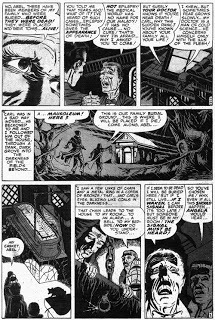
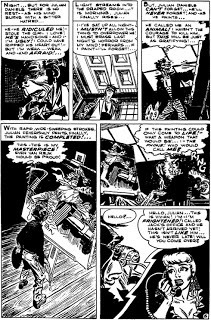
Ditko is also famous for his rendering of disembodied mouths/faces harassing either Spider-Man, Dr. Strange, or some harrowed figure from his pre-hero Marvel work. But, as you can see below, Ditko may have caught a glimpse of Kubert when designing that motif.
“The Yellow Streak” page is Kubert from Speed Comics #42, Mar ’46. The Ditko “Help!” page is from Strange Tales #94, Mar ’62, and the 3-panel montage is also Ditko, from a late 1950s Charlton, a Dr. Strange story and an Amazing Spider-Man story, both from 1965.
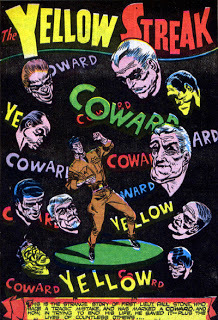
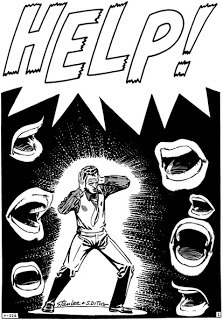
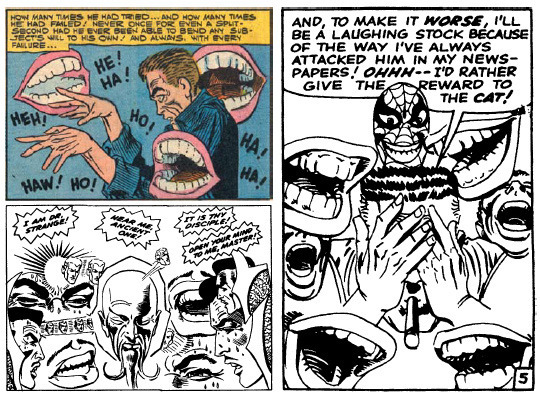 Below is a Ditko splash to one of his first works: The Thing! #13, Apr ’54. Dave Sim, creator of Cerebus, and a devotee of Kubert, said (when I sent him a pile of 1950s/60s Ditko), “The really interesting thing about this one, and something that I had never seen before, is the similarity of Steve Ditko’s early drawing style to Joe Kubert’s work. It’s particularly noticeable in Ken’s posture in panel 2 on page one, Allen’s face in the next panel, Ken’s figure in the last panel on page 4, the panel where Ken and Marion Welles meet for the first time on page 5. (Sim also noted that “same Kubert look” in Ditko’s ‘The Vanishing Martians’ from Marvel Tales #147, Jun ‘56.)
Below is a Ditko splash to one of his first works: The Thing! #13, Apr ’54. Dave Sim, creator of Cerebus, and a devotee of Kubert, said (when I sent him a pile of 1950s/60s Ditko), “The really interesting thing about this one, and something that I had never seen before, is the similarity of Steve Ditko’s early drawing style to Joe Kubert’s work. It’s particularly noticeable in Ken’s posture in panel 2 on page one, Allen’s face in the next panel, Ken’s figure in the last panel on page 4, the panel where Ken and Marion Welles meet for the first time on page 5. (Sim also noted that “same Kubert look” in Ditko’s ‘The Vanishing Martians’ from Marvel Tales #147, Jun ‘56.)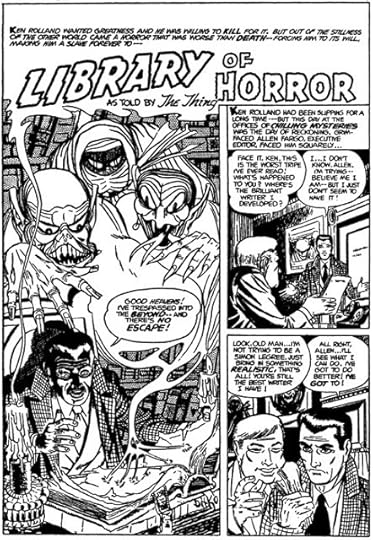 What is interesting about the connection between the two is the friction it created when mentioned. At one of my Steve Ditko panels in the past 10 years (I think at a San Diego Comicon), a member of the Kubert School told the story about when he mentioned to Kubert the resemblance and Kubert shut down on him big time. Fantagraphics co-publisher, Gary Groth, also one of my panels, mentioned that he tried to address the matter with Kubert but was rebuffed.
What is interesting about the connection between the two is the friction it created when mentioned. At one of my Steve Ditko panels in the past 10 years (I think at a San Diego Comicon), a member of the Kubert School told the story about when he mentioned to Kubert the resemblance and Kubert shut down on him big time. Fantagraphics co-publisher, Gary Groth, also one of my panels, mentioned that he tried to address the matter with Kubert but was rebuffed.I don’t believe Ditko has ever mentioned Kubert (although Ditko has only ever mentioned Robinson as a direct influence, because of their teacher/student relationship), and I don’t think Kubert is in print addressing the matter at any length.
Nonetheless, Ditko is one of many artists in the comic-book field that was influenced by Kubert. Both men’s legacies are secured, and Kubert’s influence on the industry as a whole is seen this week in the number of tributes documented by industry peers, and non-industry media outlets.
August 12, 2012
Joe Kubert: My Memories
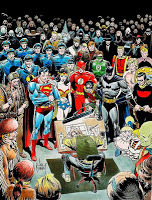 Comic-book legend Joe Kubert has passed away at the age of 85. His first published work dates back to 1942 and he was going strong to this day. His catalog of work is extraordinary, as is the quality of the work from start to finish, a true rarity. He also left a huge legacy on three other fronts: he influenced a number of artists, including a young Steve Ditko back in the early 1950s (Ditko's earliest work in 1953-54 bares a remarkable resemblance to Kubert, not just in how Ditko drew his faces, but in how he laid out a page and how he set up a panel).
Comic-book legend Joe Kubert has passed away at the age of 85. His first published work dates back to 1942 and he was going strong to this day. His catalog of work is extraordinary, as is the quality of the work from start to finish, a true rarity. He also left a huge legacy on three other fronts: he influenced a number of artists, including a young Steve Ditko back in the early 1950s (Ditko's earliest work in 1953-54 bares a remarkable resemblance to Kubert, not just in how Ditko drew his faces, but in how he laid out a page and how he set up a panel).Kubert also influenced generations of artists through the Kubert school, and through his two sons, Andy and Adam, who have gone onto great heights in the industry as artists.
My association with Joe began in late 2001 when I convinced his lovely wife, the late Muriel Kubert, to participate in my first book, "I Have To Live With This Guy!" that was published by TwoMorrows in 2002. Muriel was a very strong woman, no-nonsense, and a strong force in the Kubert School.
To promote the book, I hosted a "Joe and Adam Kubert" Panel at a Toronto Comicon on August 24, 2002 (in the front row was Dave Sim, who disappeared with Joe after the panel to talk about the school, etc.). Here's a (long) transcript of the panel after the jump. God bless you, Joe, as you join Muriel in Heaven...
Joe & Adam Kubert Panel(8/24/02 – Toronto)
Blake Bell: Welcome you to the Kubert Family Panel today at the 2002 Toronto Comic Convention. We're very honored to have - my immediate right of course - one of the top artists in the business working on the X-Men, please welcome Adam Kubert! To Adam's immediate right, we have not only the father of Adam but one of the forefathers of the industry. Please welcome Joe Kubert!What brought about this panel was the "Father & Sons" issue of Comic Book Artist #20. It’s a flip issue featuring interviews with Joe, Adam and Andy. The other side has the Romitas. One of the things that brought about my connection with Joe was that I authored a book for TwoMorrows called “I Have to Live with This Guy!” I interviewed the wives, spouses and partners of various cartoonists over the years. I was able to interview Joe's wife Muriel.Fathers and sons: You two are a unique breed in this industry. There’s few who have achieved the same level of recognition. Joe, when did you realize that Andy andAdam - these two specifically, because you have five children - would be artists? Why these two and not the other three in the family.
Joe Kubert: The fact that Adam and Andy were the ones who decided to become cartoonists probably was as much a surprise to me as anybody in the business. I knew they had an initial interest in art early on, Adam even before Andy. Adam's direction was towards medical illustration. He had attended the Rochester Institute of Technology, had graduated, and gotten a job as a medical illustrator. Then he suddenly turned toward cartooning. Andy had gone up to Rochester also, as a designer, not even as an illustrator. He started drawing perhaps when he was I guess sixteen or seventeen. That’s kind of late in terms of most cartoonists having started - most artists having started - and he too turned to cartooning.I was as surprised as anyone that they had made the decision. That they're doing this kind of work and love this work (apparently as much as I do) is nothing short of a miracle to me.
Blake: Muriel told me you worked at home for the years all the children were raised and that none of the children were exposed to anything different. I was curious as to why you felt that Adam and Andy took to cartooning?
Joe: I really have no idea.
Blake: Adam, I was wondering your first memories of your father's work and the impact it had on you. What are your first memories of that?
Adam: My first memories of him doing what he does were being in the studio all the time. The door was always open for us to ask him whatever. Dad was always home, Dad was always drawing, and it was nice. I knew nothing different.
Blake: Do you remember the first character that you associate in your head that he did?
Adam: He brought home comics every month. I thumbed through those and had a few favorites, but I liked the characters more than the guys that drew them. As far as what my dad drew, it was the army stuff, the Tarzan stuff. As a kid, I didn't really appreciate what he did until now. In my teens, I really appreciated what he could do, but when I was younger it didn't phase me.
Blake: John and Virginia Romita grew up in the same neighborhood and with the level of poverty they had, one comic would have to suffice for a whole neighborhood. Did you take comics, and what your father did, for granted back then?
Adam: Yes, they were always around. We had tons of DC books around. Growing up, I never even knew Marvel existed. I never went out to the store to buy comics because they were always there.
Blake: Adam, you were born in 1959, so the potential was there to be exposed to the whole Silver Age of Marvel.
Adam: Yes, and I wasn't.
Blake: As opposed to your other sisters and brothers, do you have any idea why they did not express certain interests in artwork, and you and Andy gravitated to it?
Adam: I think with drawing there's an innate talent that certain people have, and it can be developed. I guess Andy and I had that. My sister and brothers were creative in different ways. This just happens to be the thing that we fell into.
Blake: John Romita Jr. talked about when his father brought home the cover to Daredevil #12, as opposed to the boring romance that he had done. Now he was now, ‘Ka-zar? What's the sense about that? Was there a defining moment for you?
Adam: I wish I had something like that, because it would be a nice romantic notion that Dad had this cover, that everything clicked and this is what I want to do the rest of my life, but it wasn't that way. It really wasn't even until later that I went to school for medical illustration. I didn't want to go into comic books. I wanted find my own niche. I knew at that point what he did and I wanted to get out of the house and go away to college. I liked science, I liked art, and I put the two together.I got accepted for it, but all through college I was drawing things out of my head. It was like I was fighting it. After I got out, I thought, ‘Why fight it?’ That's why I decided to get into it. It wasn't the one Tarzan cover that he had done that just clicked in my head and this is what I want to do the rest of my life.
Joe: While the kids were growing up, I'd given each one an opportunity maybe to do lettering. I'd try to kind of break them into that. Adam took to it. He was lettering at the age of twelve for me andfor other artists as well. Andy when he was very young took to lettering. The other kids didn't. They tried it but they just didn't have the patience. They just didn't feel that this was what they wanted to do.
Blake: That's something you offered to all the children?
Joe: Yes. It was an offer not only to perhaps get into the field of art through the back door, but also to make a couple of bucks. They got paid for the lettering - a pretty good incentive, but the only two who were really interested - for whatever reason - were Adam and Andy.
Adam: My dad taught me how to letter. To make sure we had the patience to do it, we had to measure out the lines on one side, then measure out the lines on the other, and do the alphabet on a ten by fifteen sheet of paper, by hand, filling up both sides. If we made it past that test…It takes a lot of patience for a twelve or thirteen-year-old to do that. Then we moved on from there.
Blake: Adam, you were the one who was on "What's My Line?" as the "youngest professional comic book letterer?" What was that experience like?
Adam: I was scared, even more scared than I am right now! "What's My Line?" was a game show. It was like twenty-five or so years ago when I was on it and they would guess your occupation. We watched the show at home and my mom says, "Why don't you mail in and see if you can get on it?" Miraculously I did.It was filmed right in New York and we're maybe an hour from New York. I went in there, signed in and Soupy Sales guessed who I was after the second guess. When I signed in, they made me letter my name on the board which was like a dead giveaway. One of the questions Soupy Sales asked me was "Are you some sort of calligrapher?" I didn't know what calligraphy meant! So I looked at Larry Blyden - he was the emcee - and he goes, "Yeah, yeah, yeah, you're a calligrapher!" I said, "Okay, I guess I am."
Blake: One thing that draws me to the two families is noticing the similarities that follow father and son down through the ages. Joe, I remember reading that your mother was the treasurer in the family. For those who don't know, Joe started at a very young age in the comic industry. Was it the very late thirties, or early forties?
Joe: The Stone Age, I used to cut it out of big boulders!
Blake: Of course all the money you would have earned at that time, as a young teenager, your mother was the treasurer of that.
Joe: I was kind of first generation Americans. From the Old Country, the way it worked was the father and the mother were the bosses. While the children lived at home, if any of the kids (I had four sisters) went out and got jobs, we never cashed the cheque. The money would go directly to my mother, who was the treasurer. Whenever we needed any money, we'd get it from them, if they felt we deserved the money at that particular time. But yes, that's the way it worked. No objections to that, no objection from me ormy sisters.
Blake: I was going to ask you Adam, making money as a letterer on a comic book...
Adam: I kept all my money!
Blake: Was Muriel “the treasurer?”
Adam: My mom used to...
Joe: It doesn't work that way - second generation - it doesn't work that way.
Adam: She'd have to tear the money out of my hands.
Blake: I tried to get Muriel to say what kind of influence she had on you, Adam, growing up, and what she provided in terms of inspiration, push, for your career. She wouldn't give up anything, but...
Adam: That's a hard question. My mom was nurturing. She always said, and my dad always said, "Do what you want to do. Whatever it is you want to do, that's the direction your career should take. Whatever it is, even if it was pumping gas, if that's what you love to do you'll be successful at that. But they wanted me to find out what I wanted to do. They didn't want to tell me, "This is what you should do. It makes a lot of money, you'll be happy."
Blake: When you were at the Rochester Institute of Technology, you were medical rendering, you weren't really drawing...
Adam: Right... medical illustration.
Blake: I remember a quote where you talked about rendering as opposed to drawing. Is that what pushed you away? You felt stifled by rendering, as opposed to pulling things out of your head?
Adam: No, not really. I love rendering. I love rendering in my comics. I love noodling, and doing all the little detail stuff and backgrounds. I liked drawing out of my head a lot more. It was a lot more creative, a lot more freedom. In medical illustration, you have to deal with doctors. Certain ones have an attitude towards artists, which I didn't quite agree with or like. With comic books, there was just a lot more freedom and a lot more fun.
Blake: Working on a monthly schedule - a book that has to come out every month - do you find that freedom still there for you after all these years?
Adam: I'm the type of person that needs a deadline. So if I have a monthly schedule, I'll get that book out…Close to the monthly schedule.
Joe: More or less, more or less!
Adam: More or less, close to it. I like having deadlines, and I like having the pressure that forces me to get the stuff done. I think the pressure forces you to make decisions quickly, and a lot of times those initial decisions are the ones that are best, rather than sitting, struggling and trying to figure out, "Well, I could do it this way or this way or this way." If you have that clock that you're watching, you make that decision, and usually it's the right one.
Blake: There’s a lot of talk about freedom but, Joe, when you were working for D.C., you had a script, by Robert Kanigher or whomever, and you drew the scripts. It was a full script, whereas opposed to now, and starting with the whole Marvel Age, artists do have a lot more freedom, to interpret.
Joe: In one way it's freedom, and another way, it's an assumed responsibility that really shouldn't fall on the artist's back. The more freedom an artist has, I think, the more able he is to express his own individual direction, and the kinds of illustrations that he wants to do, but to me it was kind of a reverse way of actually accomplishing the kind of work we do. It gave certain responsibilities to the artist that he shouldn't have.The artist is an illustrator. The artist's responsibility is taking a script and telling the story the best way he knows how. He may refine the script, he may add a panel, or subtract, combine panels. But to have to actually break down an entire paragraph, which is a very rough form of text, into the number of panels that might work, and then have the writer put the dialogue in, it may directly affect - in an ill way - the composition of that panel, because the writer then has the prerogative to put text in, wherever he feels it's going to work. The artist already has designed that panel. This new element of text being put into that panel can completely destroy, or at the very least distort, the composition that the artist had in mind. I think that's a screwed-up way of doing things.
Blake: Adam, you do it that way, don't you?
Adam: That's the way we do it! We do it the screwed-up way! I agree with my dad. I think the best way is if you have the dialogue, you know how much space that'll take up. The artist can place it in the panel. I don't know how many times I'll see in my comic the balloon over an important part of the illustration, or ruining the composition. That's the way we work it now. It's not my preference but it's the way it's done.
Joe: I finished a Batman book with Stan Lee. I said, "Yeah, it will be a pleasure to work with Stan." I'd never worked with him before. But I said, "I will not work this where Stan or anybody else is going to put the dialogue in after I do the drawings." I want to know where that dialogue is going in, in terms of how it may or may not affect my composition. Stan accommodated me.
Blake: How does one accommodate you in that regard?
Joe: He wrote the script, broke it down into panel form - he didn't have the dialogue on it at that point. I then showed him eight-and-a-half by eleven or small breakdowns of what I intended to do for the story. He then wrote the dialogue. I placed the dialogue in.
Blake: That sounds like it might have been the first time that he's ever worked in such a fashion.
Joe: I know, but that's the only way I would work it.
Blake: Adam, do you find freedom in the style that you work at Marvel now, or do you find that restrictive? Have you been able to work with writers and say – not literally – “Can we move it a little more towards how my father did it?" Have you been able to accomplish that in any way?
Adam: No, I haven't.
Joe: I can tell you why. Stan was able to accommodate me simply because there was enough time. The work could go back and forth, so I could place the text where I felt it should go. In Adam's case, deadlines are the bane of the existence of every commercial artist or cartoonist. Every job you get has a deadline, and invariably that deadline never is long enough to accommodate the kind of work that you'd like to do. Under those conditions, anything that extends the amount of time that it takes to do the work can play havoc with that deadline. So he doesn't have the luxury of sending it back, waiting then to place it. There just isn't enough time to do that.
Adam: The guys that are work with are the tops in the field. Once in a while there'll be a mistake. It's all subjective, too. You have to live with that. Mistakes are going to happen and it's just part of the job. Yes, I would love to be able to spend six months on one book, and make sure that book is absolutely perfect, but that's not realistic. You have to keep in mind that you're making a living doing this, too. Not everything's going to be perfect. You do it the best possible way you can in the time that you have.One of the things that I really enjoy about working on a monthly is you can take a lot of chances because you have a thirty-day window to get this job done. You can take chances in that thirty-day window because next month you're doing the same thing all over again. So there's a certain amount of risk that you can take when you do have a shorter amount of time to do it, I feel. And you always have that next month where you can try something else or if it works, you can feed off of that, and try something new.
Blake: In any potential future creator-owned project, do you see yourself doing it as you ideally would like to, as we’ve talked about here? Do you see a time for that in the future?
Adam: At some point that's what I'm going to do, but I'm going to have deadlines for myself, where I have to get it done in a certain amount of time. I could see, just based on what other guys have done, you can't make a living doing a book every six months. You can't have your eye on the movie prize or the toy prize. You have to keep your eye on what's right in front of you because that'swhat has to be successful.
Blake: So Joe, with Andy not here today, we're hearing Adam talk about how he needs deadlines. With Andy growing up, was he the same kind of temperament in that regard?
Adam: He's a machine! He's totally different.
Joe: I might start off by saying that Andy is a big, hulking guy and he was scared to death, number one, to maybe have to fly up to Toronto, and number two, to get in front of people is the worstthing in the world for him. Andy, as Adam has just mentioned, is different from me, and is quite different from Adam. He is up at like, six o'clock in the morning, he sits at that table at six-thirty, seven o'clock. He puts in his day until five, six o'clock at night.
Adam: No, he's there like seven to twelve, one to five, every day. I mean, you could set your clock by him. And he gets it done in that time. Me, I brought my work with me in case I have a little time to do some stuff.
Joe: Which you won't do anyhow!
Adam: But I have to have it with me, 'cause I feel better.
Blake: Joe, how did that impact the family, being as prolific as you were? I talked to Gene and Adrienne Colan about working late into the night. How were you able to keep that under control? Were you able to keep it restrained so you had enough time for the family? What kind of impact does it have being a freelancer at the time you were that prolific?
Joe: It varies from person to person, but before I got married, pulling all-nighters was the norm. I'd kind of let the work fly, and then put twenty-four or forty-eight hours straight without sleep in order to finish the job. I'd then take off a couple of days and that would be the end of it.But being married and having a bunch of kids, I tried to lead a kind of normal life so that the burden of raising kids didn’t fall on my wife. Five kids is a lot of kids running around the place. I felt that it was incumbent upon me to put in a normal day's work. When I got married, and especially when the kids came, I tried to keep the work as much on a nine-to-five kind of basis that I possibly could. Invariably we'd take vacations, and I liked to take the kids with me. We'd rent a motor home or a trailer, so I could take the kids along. Not so that it'd be a wonderful experience for the kids. I took them along...
Adam: ...so he'd make sure we weren't getting into trouble at home!
Joe: That's right! I can only imagine the stuff that they could get into if we weren't there. So I took them along, not for their benefit, but for my benefit - to know that they were “within reach,” so to speak. It was great for me because I saw my kids grow up. I was with them most of the time. If there was a problem I was there to kind of help. I was working at home, more in touch with what was happening with my family than most others are with their family. I felt rather fortunate to do so.
Blake: Adam, how does that same cycle play out for you and your family, in terms of your schedule and how much you're able to balance that?
Adam: I'm a little different. I have a studio that's separate from home. The first six months when Max was born, I tried working at home. I found it difficult to get my stuff done. I had a lot of distractions. I had my refrigerator, I had the TV and I had my son. I like the separation between work and home. I find when I'm at work, I'm working; when I'm at home, I'm at home. That's how it's different for me.
Blake: Will Eisner's the same way. He likes to leave his home, go out, do whatever he has to - sometimes he might bring back fan letters to answer - but he also likes to have that separation. He would have done it all the time they were in New York, going out to a New York office and coming back.
Joe: I think each individual has their own mode, their own way of living and no two are exactly alike. Will, who's one of the greatest guys in the world, sets himself up so that he's about a mile away from his home and feels that separation is necessary for him. For me, being home was terrific; I loved it just that way. Nothing really impinged on the work.
Blake: Joe, during the '60s and '70s, wouldn't you have to walk through Adam’s bedroom to get to the studio?
Adam: Yes.
Blake: Joe, what was your studio like at that time? In terms of the noise, in terms of the activity, would you have to lock the door to keep discipline or could you have music or talk radio playing?
Joe: I'd have the radio going, music or talk, but I never had any compunction about the kids coming in. If they had to tell me something or watch me work it didn't bother me at all. At the school now, a student will come in. Adam and Andy have their studios in my school now, so they'll come in and show me the work that's going on. As a matter of fact I look forward to those kinds of so called interruptions. I have no problem in stopping, putting myself into gear where I'm talking to somebody or about something else and getting right back to my work.
Adam: I don't know how he does it.
Blake: Adam, is it dead silence in you studio?
Adam: No, no, it depends on what portion of the job I'm working on. If I'm laying out pages it has to be completely quiet. I really have to think about it. If I'm just drawing, I have music or talk - Howard Stern or something.If I'm doing rendering, where I really don't have to think and am just laying in blacks and details, I could be talking on the phone. It's different levels of concentration. I'd like to bring up one thing. My Dad’s studio was in the room above the garage and he had to walk through our bedroom to get to the studio. It's late at night and I hear the sound of footsteps going through our room. Andy and I both slept in the same room. You’d wake up and you’d see Dad, but when he first taught me how to letter, he set up a little drawing table in his studio so that's where I sat and lettered with him just over there.
Blake: Muriel talked about the difference between Joe’s ability to work with music and talk radio - the difference between music and between listening to chatter.
Joe: Its’ pretty much as Adam described. Certain facets and phases of the work that we do takes more concentration than others. For me, what takes the most concentration and thought is breaking out a page so that sequentially the panels that you're drawing tell a story smoothly and clearly. During those times I can listen to some background music. I'm not even aware of what I'm listening to, so it's like a background motif that's happening somewhere in another room.However, once I'm past that layout and penciling stage, the inking, the finishing off is almost automatic for me. At that time I can listen to talk, listen to anybody, and can talk to anybody while I'm working. As Adam said, there are different phases of the work that demand different intensities in concentration.
Blake: Adam, obviously you got a lot of encouragement from your father, but who else in the industry affected your work, gave you encouragement, pushed you to whatever the next level would have been?
Adam: My first job out of my dad's school was actually lettering for Heavy Metal magazine. It was the type of magazine that was all re-published work from Europe. It all had to be translated into English, so they needed a letterer to re-letter it. I saw all this great work that I never knew existed really before. I knew a lot of it did, but getting to see it all first-hand, a lot of that stuff really influenced me.Serpieri is one of my favourites. Moebius, Druilliet and Manara; all those European artists can really, really draw. Not that we can't - there's guys here that are totally amazing too - but the stuff over there for some reason has a flavor and a personality. It just seems such a personal way that they express themselves. A lot of times, superhero comics are just copying or feeding off of one another. A lot of guys see what's popular and they incorporate that into their work. I think the most important thing is to express yourself the way you feel you want to express yourself, not the way someone else expresses themselves. It's good to be influenced by what other people are doing - you take little bits and pieces of what they're doing and make it your own - but it's really important just to do your own thing.
Blake: John Romita Jr. would talk about when he went to Marvel, he got a lot of backlash from people who said, "Oh, you're just here because of your father." He talked about Marie Severin being one who really gave him some grounding there and helped him get through that bit of a rough patch. Who at Marvel, or at any companies, would have been someone who gave you encouragement, pushed you along - not necessarily from the shadow of a father angle but just somebody who helped you out? Was it an editor or a writer?
Adam: The first guy that really helped me along was Mike Carlin, besides my dad, of course. Mike showed me the importance of meeting the deadline and storytelling being the most important thing. At Marvel, I don't know of anyone really who...
Blake: You were established enough by that point?
Adam: Not really but at Marvel I worked with a certain few editors. I didn't work with everyone, I would have loved to have had the opportunity to work with Archie Goodwin, which I never did, unfortunately. But the really great editors, the people I worked with weren't that...
Blake: This is Marvel's troubled days? Is that why? Now at Marvel, it seems to be stronger in terms of more of a presence at the top, with Quesada and all those guys. Back in the early nineties, it doesn't sound like there might have been that type of firm leadership there.
Adam: Right. They just wanted you to do what you did. There really wasn't a direction. Right now, I'm working with Ralph Macchio. He's the best editor I've ever worked with. He gives me a lot of editorial direction. He lets me know exactly where I stand, deadline-wise, and what I have to get done by a certain amount of time. "If we don't get it done by now, by this time, Adam, we're going to have to do this, this, this and this." There's no B.S., he calls me right back, and when I send in pages, he lets me know what he thinks of them, good and bad. I think that's important.As a freelancer, you're out in East Bum-wherever and you don't know what the people really think of the work. You want to please them, you want to please yourself, but you want to know that what you're doing is acceptable to them. This is your job. If there's no contact between you and your editor, you feel like, "What's going on? He doesn't like it." I think that having a good rapport and a good communication between the artist, freelancer, editor and publisher is important.
Blake: Joe, in a lot of the interviews you've talked about your desire to see your sons become, and stay, full artists (for lack of a better word) in terms of taking over the full process of their work. You feel that will elevate them to another level and allow their own voice to stand out. Can you comment on that?
Joe: I think that this is a process that Adam and Andy are both going through right now. To make it clear to people perhaps outside of the business, the business of producing comic books has fractured into any number of specific jobs in order to complete the work. There may be somebody who breaks down a strip, just does the rough break downs per page for a strip. Then there'd be somebody who does the finished pencils. Then there'd be somebody who does the inking. Then there'd be somebody who does the lettering. Then there's somebody who may be inking the backgrounds, somebody who just inks the figures, and so on.I think that the result of all this is so generic, so non-focused on one individual, that the work itself loses any kind of characteristics. Adam and Andy are probably, from what I can see, two of the most popular and successful guys in the business. Just their pencils is enough to give the book a thrust forward with better sales. The more work they're able to turn out, the better off the company is, and the better off Adam and Andy are.However, I feel that there's a penalty for them individually. The penalty is that they don't produce the kind of work that reflects their own voice. Nobody else sees their pencils, but I see what they do in their original pencil work. This is not to deprecate the inking, because those guys do a great job, but it's not Adam and Andy's work. I've seen the kind of inking that both the boys do on their own work. It’s quite different and it really reflects what they are capable of doing. If anybody could see their pencils, they'd appreciate what I'm saying now. It kind of bugs me that the work stops at their pencils, and takes another direction completely that really doesn't reflect the ability that these two guys have.Eventually they'll get to that point. Frankly, Marvel has been paying them so much money that they can't affordnot to do what they're doing.
Adam: How much is that money?
Joe: But I'm still waiting for them to be in a good position where they can turn out the complete job themselves. As Adam said, it's very difficult to make a livelihood when you turn out one book every six months. Indeed if they're going to pencil and ink, check over the coloring, and make sure the lettering is good, they're not going to be able to turn out twenty-two pages a month, which is what they do now.
Blake: Adam, what are the thoughts as you hear that from your father?
Adam: Back when I did pencil and ink covers - now covers are I do just go right from penciling, penciled real tight and they're colored digitally right from the pencils - the covers were my salvation. I would pencil and ink all my own covers. I don't even do that any more because of this. Yes, he's absolutely right. It's my own voice when I pencil and ink my own stuff, and I'd love to get to color. I've colored, I've painted too. I'd love to do the whole thing, and that'll come sometime.It's time constraints. I can't pencil and ink a book in a month. I don't think I could do it in two months, because I'd just get so anal about the whole thing. It’d have to be done a certain way. Right now, I enjoy penciling. I do a page, I pencil it, it's done, ready for the next one. If I'm penciling and inking, it's a different type of mentality.
Blake: What joy do you find in that penciling that allows you just to say, "It's gone, I'm happy?"*Adam: I love to draw. I pencil it and it's done. I don't have to ink or color it. It's done and I can move on to the next one.
Blake: Is it the problem solving of the layouts that you find the most joy in?
Adam: When I'm penciling, what I enjoy is when I'm done with a drawing - because you have to get past the stage of where it's still ugly, still rough, where it really doesn't look like a good drawing - I look at it I say, "Wow, that looks pretty good! I kinda like that!" I like the storytelling, the problem solving of how to lay out a page, and how to tell the story a little differently than I've done it before.
Blake: Jack Kirby felt almost that he was tracing if he would ink his own work: “Well, I've got other things to get on to." Does that ring a familiar tone?
Adam: It depends on the type of penciling. For my Dad, it's not tracing because his pencils are pretty much non-existent. It looks like Picasso. But for me I pencil tighter even when I'm inking my own stuff. If it's down there then I'm more comfortable when I'm inking. I can take more chances as I'm inking if I know what direction I'm going in.
Joe: If anybody has ever seen any of the work that Jack Kirby has inked over his own stuff, it was absolutely magnificent. It turned his pencils into the kind of work that you wouldn't recognize when somebody else inks it. It was a completely different animal, and I thought it was great.
Blake: Adam, there's a quote from the Comic Book Artist issue that I was interested to explore with the two of you: "I think if he (referring to Joe, of course) was my boss, we might butt heads a little bit because there are certain ways he likes to do things and certain ways I feel strongly about doing certain things."
Adam: Covers. I like doing all different kinds of covers: there's pin-up covers, there's storytelling covers, there's flashy covers, there's foil covers... I like 'em all. The cover is meant to attract a person enough to pick up the book, start flipping through it and buy it. Pin-up covers are fun. I like drawing the one illustration. A storytelling cover, with Sergeant Rock behind a big wall with a big tank coming over it, that would be fun, too.
Blake: Joe, you hear "pin-up" and you almost started chuckling?
Joe: Yes, any cover that sells a magazine I think is great. But I think the most effective covers are those that give some indication of what's going on inside the book, which would cause the person to want to read the interior of the book.
Blake: They didn't give me cork board to put that up, but this is a Star Spangled War cover, a very nice one that I've enjoyed of the Unknown Soldier with the shark.
Adam: I have that! It's great.
Joe: That's precisely what I feel the cover should be. It’s an indication of what's going on in the book, and the reader should want to read what's inside as a result of that cover. A pin-up cover, as a change, is good. I just don't think they're as effective, that's all.
Blake: Irwin Donenfeld, who was the publisher of DC from about 1957 to the late sixties, would talk about DC doing covers and they'd pick a nice image for a cover and they'd say "Let's build a story behind this cover."
Joe: That happened sometimes but most often they never had the luxury to do that because they were late in both of those areas. Bob Kanigher, who was a fantastic writer, the editor of all the war books at one time and created the Sergeant Rock character for that matter, did a story and to describe a cover to be done, he wrote it on the bottom of the cover, "Drop an inch." He meant that the cover illustration was too high and to bring the illustration down. When they printed it, they actually put “Drop an inch” on it! He had to write a story for it, which he did.
Blake: Joe, you described to me an incident for my book about the impact that a father can have on the growth of a son as a teenager. Could you recount the story about Andy, where he was very frustrated working on this drawing.
Joe: When you prefaced the story, it sounded like such an Earth-shattering kind of thing, which it wasn't! As a parent, speaking for myself, you only find out a little bit too late that some of the minor actions that you might take have an effect on a kid can be startling.I was working in the studio and Andy - who may have been maybe ten years old - was sitting there doing some drawing. I'm into my work that I'm doing and concentrating. He's sweating on it and finally came over to me and showed me this drawing where the eye was a little bit askew or something was the matter with it. He said, "Dad, I just can't get this. Could you help me with it?"I said, "Sure," and as quick as I could, I just did the correct drawing, and went back to my work. Andy looked at the correction that I made, looked at me, took the drawing and threw it away. He didn't draw any more. He didn't want to draw any more pictures. I really didn't pay too much attention to that. It was only a couple of years later - when he started becoming interested in drawing again - he told me that at that time he felt that he would never be able to draw that way. Because I could do it so easily, and he found it so impossible to complete that drawing, it turned him off drawing completely. It wasn't until years later that he got back to it.I had never thought about that. Even if I had known, I'm not quite sure how I could have handled it. But inadvertently, as parents, all of us will say and do things that we really aren't fully aware of how it might affect the kids.
Blake: Adam, did you have a similar experience? What was the coaching from your father at that age?
Adam: I drew for my own enjoyment. I don't really even remember coming to you much, and asking you for direction.
Joe: I would really keep my hands off. I'd try as much as possible. It’s the same thing with the students at the school. I'm very reticent about touching anybody's work. One of the things that got me mad as hell when I was going to art school was some of the teachers would be very helpful by correcting your work, taking a really nice dark pencil saying, "No, do it this way!" right on top of your artwork. I used to cringe. I wanted to kill when that happened. Being aware of that, I would be kind of sensitive not to give too much information, and certainly not to draw on top of somebody else's work. Invariably what I'll do is I'll take a piece of tracing paper, or if I'm going to make a correction, I'll ask the student or the kids first, "Do you mind if I work on top of your work?" But that's about the extent of it.
Blake: You were an editor around this time of the episode with Andy, and you were being an editor (in some sense) with your sons, in terms of that coaching back. Did that episode make you more sensitive to an artist when, as an editor, you make a correction or something of that nature?
Joe: No. The editor, just so that people would know, has the responsibility - the full responsibility - for any publication for which he's in charge. The writing, the artwork, everything up to the point of printing and publishing, is the responsibility of the editor. The publisher gives that responsibility to him. The publisher may not know anything about the work at all, but he's putting up the dough, he's responsible for the entire project.The editor in turn is responsible to make sure that the work that's coming out is according to what the publisher wanted, and is coming out with the kind of quality that's necessary. The people who are working with that editor are professionals. They know that he has the responsibility, so that if I want to make a change, that's my prerogative, that's my requisite, that's within my boundary of work. If there's gonna be a mistake in the book for which I'm editing, it's got to be my mistake. I'll stand up for my mistake. I will not assume responsibility for somebody else's mistake. That's the way it works.Bob Kanigher had been the editor for many, many years, including writing and creating characters like Enemy Ace - you could name almost any DC character in existence and Bob probably wrote a script for it. For many years he was the editor, and I was an artist working for the editor. Now there were not conflicts but perhaps, diversions, where Bob would feel that maybe it had to be done a certain way and I felt that it should be different. I always had to bend to what he wanted.It was his responsibility and it was his authority to make whatever changes as the editor. Years later, Bob had taken ill and couldn't continue with his responsibility as an editor. Our positions switched. For twenty years or twenty-five years after that, I became the editor and he was writing the script. We understood that. I knew him well and it had no impact on our relationship - our personal relationship - but business-wise if he came in with a script and I wasn't happy with it, I was not hesitant about telling him, "Bob, this has to be changed." We'd discuss it and if he could persuade me that he was right, I'd acquiesce. But ninety-nine out of a hundred times, this is the way I wanted it and this is the way it was going to be done. And he would do it that way, because he was professional enough to know that I have the responsibility and therefore the decision as to what has to be done is mine, and that's the way it works.
Blake: Adam, you were at the Kubert school in the mid-eighties and you’re there now teaching. What are the differences that you notice in professionals between then and now, in terms of professionalism, in terms of the kinds of artwork they're doing...
Adam: That's too hard…I don't know…
Joe: I think there may be one variation. When you asked Adam who his favorite editors were, I didn't want to chime in. But frankly I think what's happening is that the editors who are in positions in Marvel and in DC are ones that are really traffic managers, not editors. What is an editor's responsibility? An editor's responsibility is to have a talk with the writer in terms of plotting out what the stories were, and the lines that those stories are to take. He also then will give that script to an artist. When the artist is finished with the work, either in pencil form, or in ink form, he will go over that story wherever he feels corrections should be made, wherever he feels perhaps the artist fell short of accomplishing precisely what the writer wanted. It is the responsibility of the editor, then, to tell the artist, "Look, this doesn't look so hot," or "change it in this way," or "work in this manner."Most of the editors, I think, aren't fulfilling their jobs. He's on the phone calling these guys if they’re late, but that's what most of these editors are doing now. When I say they're traffic managers, they merely are making sure that the script goes out to the artist, the script comes back from the artist in time for the book to be published, and so on. They're not doing their job as editors, and I think that's a bad failing in the business today.
Blake: Adam, one last question. What is the greatest that gift your father has given you?
Joe: I don't give gifts!
Adam: In the business, just to be professional and to treat people how you'd want to be treated yourself. To get the work done, to being there, and to doing the best that you possibly can. Personally? That family is above and beyond the most important thing, and that's what you have to keep any eye on. You just have to keep things in perspective.
Blake: I'd like to thank Adam Kubert and Joe Kubert for coming. Thank you all very much.
July 28, 2012
Listen to 90 mins on Ditko, Everett & My Upcoming Projects
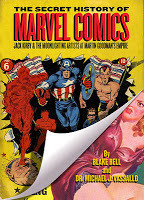 Want the latest update on the next Steve Ditko Archives (v4), Bill Everett Archives (v2), and our Secret History of Marvel Comics book that's due later this year?
Want the latest update on the next Steve Ditko Archives (v4), Bill Everett Archives (v2), and our Secret History of Marvel Comics book that's due later this year?Click here for the Distinguished Comic Book Podcast page run by Zack Kruse and Ben Tiede. Episode #38 is 90 minutes of yours truly discussing the aforementioned topics with Zack and Ben, easily downloadable into your tacknology. We also take a look behind the scenes at Fantagraphics with how these projects are put together, and discuss the Golden Age of comics that we've existed in for the past 10 years on two fronts. First, the stunning amount of archival reprint material put out by companies like Fantagraphics, Marvel, DC, etc. Second, the superb quality of graphic storytelling by the likes of Joe Sacco, Guy Delisle, Seth, Chester Brown, Chris Ware, etc. We're in the golden age of (cable) television drama and of comics, and we discuss the latter at length.
July 3, 2012
Ditko article in the New York Post
(Click HERE to read the article.)
Reed Tucker, the author of the piece, went right to Ditko's studio and got a couple of quotes from Ditko for the piece. Many people have passed around the rumour in the past decade that Ditko accepted a big chunk of money when the first movie came out a decade ago, but Ditko confirms this as a falsehood. Other than the pittance he receives when Marvel reprints his old run on Spider-Man, there has never been a single, confirmed report that Steve Ditko has received a penny from the entire, billion dollar Spider-Man franchise since he walked away from it in 1965 over concerns about Marvel's editorial direction and promised royalties (the only thing I would have changed about Reed's piece - for which I was interviewed for almost an hour - is that emphasis, but I think it does come through indirectly in the rest of the piece.)
Kinda makes that whole "Before Watchmen" debate look like kids arguing over lunch money in comparison, doesn't it?
June 19, 2012
Heart-Broken
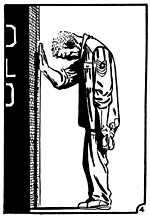 I haven't posted in awhile. I'll share with you "the whys" later because I don't want to distract from the issue at hand: two pages are missing from my latest book, Mysterious Traveler: The Steve Ditko Archives vol. 3.
I haven't posted in awhile. I'll share with you "the whys" later because I don't want to distract from the issue at hand: two pages are missing from my latest book, Mysterious Traveler: The Steve Ditko Archives vol. 3.Fantagraphics has posted a print-worthy .pdf of both pages so that they can be printed off and inserted into the book where the missing pages should be. We're also going to reprint both stories in full in the next volume, so that collectors have every Ditko story as they should.
Everyone should know this: the buck stops with me regarding these types of concerns. Not with Fantagraphics - with me. Ultimately, I review the final .pdf of the entire book, going over every page, matching it against the table of contents, etc. I'm over 1600 pages into my career of supervising the production of my books and this is worse than a knife in the gut.
I won't bore you with excuses or even reasons why this happened. Instead, I'd like to share with you the additional methods that I'll be putting into place for validating the contents of every book of mine to ensure we mitigate the risk of this ever happening again.
First, I'll be employing two "checkers" for the final .pdfs of each Ditko and Everett Archives. These will be people who know those artists and are experienced in such matters.
Second, checking the final .pdf via the printed comics will be done twice: once from the beginning of each story, and once in reverse (i.e., starting with the last page of a story and working backwards to page one). This book/experience has taught me that life can lead to the brain playing funny tricks on the mind, and there's no effort too great to ensure we prevent this in future volumes.
Third, as an added measure, I'll also be checking the final .pdf, page-by-page, versus the Grand Comics Database - the site on the Internet for referencing over one million comic-book stories published since the industry began.
In closing, if I may beg your indulgence - opening my snail-mail box once a year, pulling out the envelope from Fantagraphics and holding a brand new copy of my book - that I've poured my heart and soul into every night after coming home from my day job, looking after my children, etc. - is one of the greatest satisfactions available to me as a writer-editor and as a person. Getting this news was my darkest day because without the dedication of a core group of serious fans of this work, these Archives volumes would not be possible. I thank you all again for your continued support in my efforts to get this rare work into print, and look forward to another opportunity to do so.
May 18, 2012
#31DaysOfDitko: Revisiting "In Search Of Steve Ditko" Doc (P1)
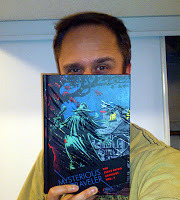 In recognition of the debut of my latest book, Mysterious Traveler: The Steve Ditko Archives vol.3 this month, May is "31 Days of Ditko" where I post highly entertaining content re: the co-creator of Spider-Man, Dr. Strange, Mr. A, half of #BeforeWatchmen, and many more.
In recognition of the debut of my latest book, Mysterious Traveler: The Steve Ditko Archives vol.3 this month, May is "31 Days of Ditko" where I post highly entertaining content re: the co-creator of Spider-Man, Dr. Strange, Mr. A, half of #BeforeWatchmen, and many more. This came back around my way when someone posted the URL to the Stan Lee portion of the 2007 documentary for BBC4, "In Search Of Steve Ditko", produced by U.K. television personality, Jonathan Ross. I have an intimate connection to this one in more ways than one and, in light of all the creators' rights issues that have resurfaced surrounding the Avengers movie, let's revisit one of the rare instances when someone with enough clout outside of comics used that clout to bring comics to a mass audience. First, though, go watch the thing, and then we'll be back tomorrow with more. You can also read a piece that Ross did about the doc for The Guardian newspaper at the time.
May 16, 2012
#31DaysOfDitko: OddBall Ditko
Today, we go hyper on examples of the oddest stuff Ditko has ever done. When you've worked almost 60 years in the business, especially when you pulled a "John Galt Split" (i.e., working on your personal material while making a living by taking "last rung of the ladder" material), you've likely pulled down a few whack jobs, and Ditko is no exception. Roll credits (click to enlarge)...

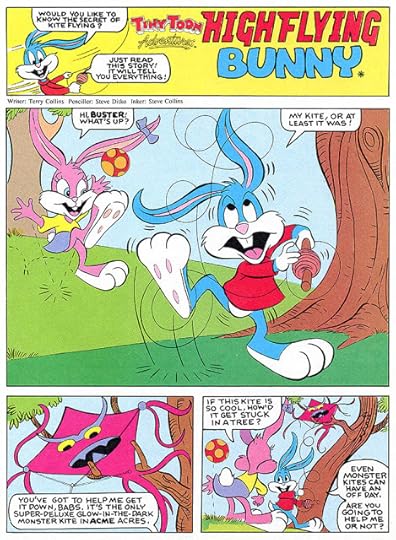
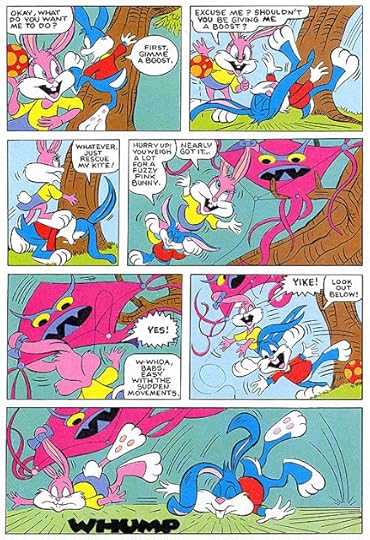
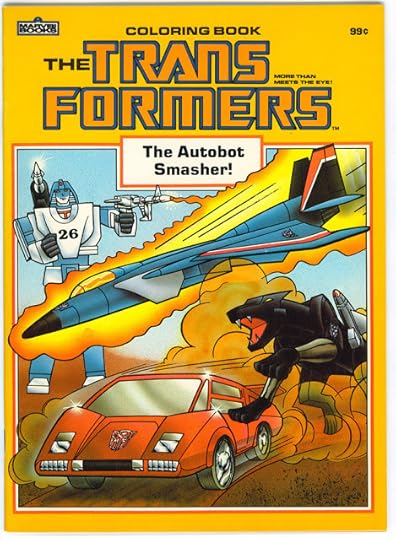
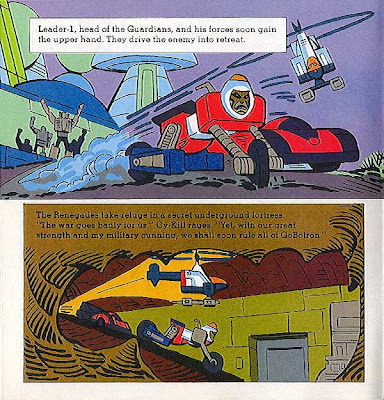
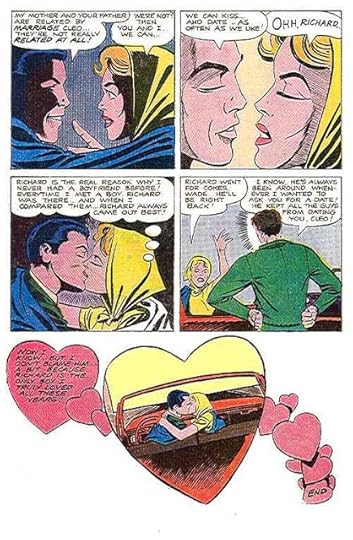

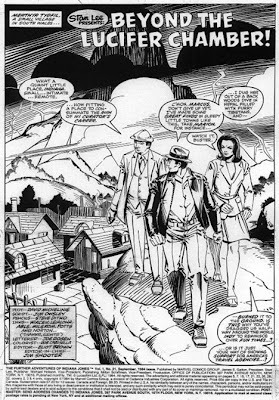
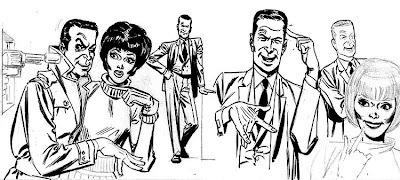
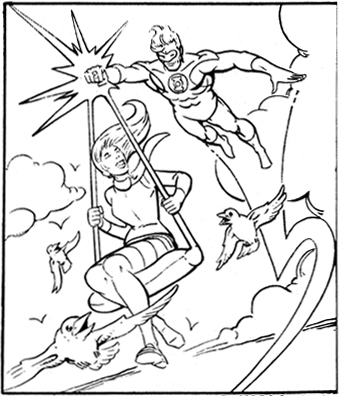
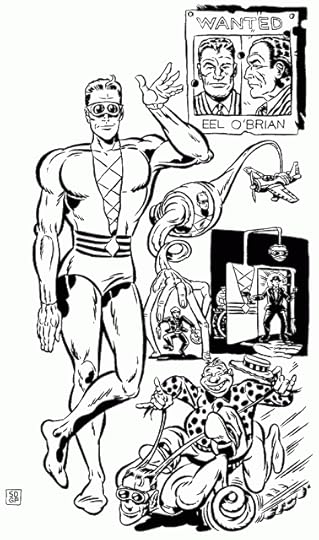
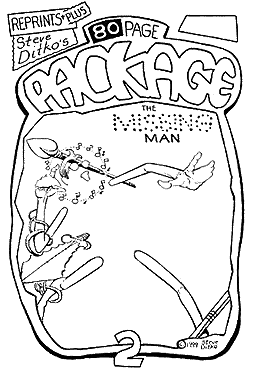
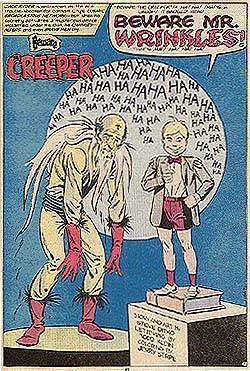

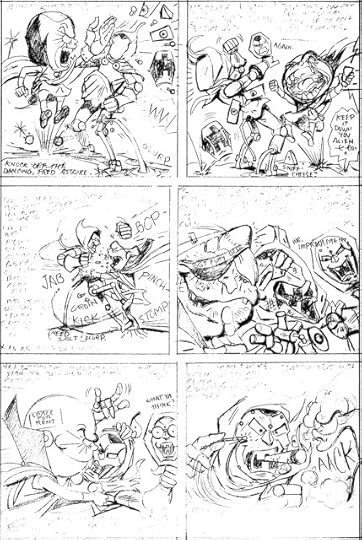
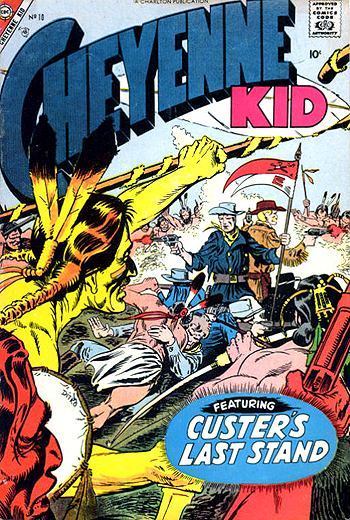

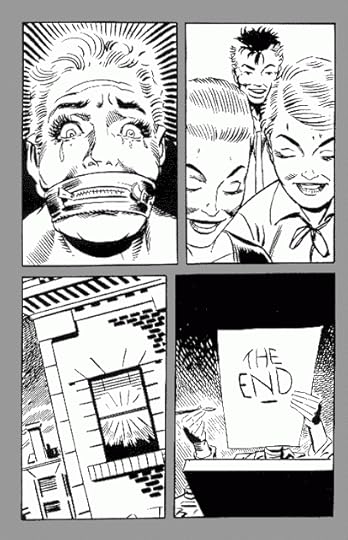
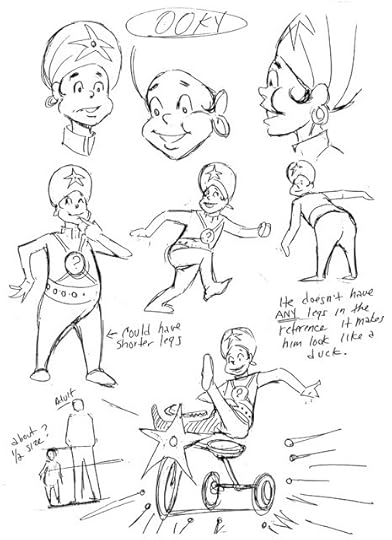
May 15, 2012
#31DaysOfDitko Dave Sim reviews 1960s Ditko
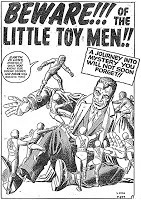 “Beware!!! Of the Little Toy Men!!”
“Beware!!! Of the Little Toy Men!!”JOURNEY INTO MYSTERY #58 (May ’60)
I tell you, folks, Ditko is just full of surprises. In this case, the sudden use of hatching and cross-hatching which hasn’t cropped up before – here starting with the pin-stripe suit on the character on the splash page, a tradition which comes far more from the Alex Raymond end of things rather than the Milt Caniff end of things Ditko usually inhabits. I’d have to call this style Hatched Iconic because of the laborious line-work. He’s still stripping down his rendering to an iconic level of composition but then he seems to be coming back the other way and adding hatching to give the image greater weight and density.
This batch of pre-Spider-man Marvel stories raise some interesting questions – was the reduction to an Iconic splash page an editorial decision on the part of Marvel or an individual decision on the part of Ditko? It’s a good one in terms of “branding” – you couldn’t mistake the splash pages on Marvel mystery stories prior to 1961 for anyone else’s splash pages. The story titles on a bunch of them are all in the same typeface as well. Dry transfer lettering? An Artie Simek template font that anyone with a ruler and some tracing paper could duplicate? Marvel, thy name is economy!
Past the splash page the story pages are definitely High Density Ditko, the nine-panel grid and no skimping on the foregrounds, backgrounds and full figure shots. High Density Plus with the addition of the hatching and cross-hatching. One of the saddest of all possible situations, the story has a great set-up, visual, imaginative as all get-out -- it’s almost as if Ditko felt compelled to acknowledge that and went the extra mile on every page and every panel with lots of extra detail and cross-hatching and bringing his best game to the table -- and then the whole story just falls flat as a pancake in the last three panels. I think Ditko and the other guys had to be philosophical about that at the time. Give them four and a half out of five pages that they were psyched to draw and they would just ignore the lame ending.
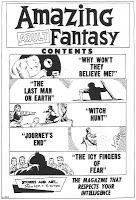 “The Icy Fingers of Fear”
“The Icy Fingers of Fear”“Why Won’t They Believe Me?”
“Witch Hunt”
“The Last Man on Earth”
“Journey’s End”
AMAZING ADULT FANTASY #7 (Dec. 61)
This batch of five stories, all from the same issue (sporting one of the greatest pre-super-hero Ditko covers in Marvel’s history – even the colouring is great!) interested me because they’re all in the same category as “There It Is Again!”
All are scripted by Stan Lee and it’s as if he cracked the Ditko code and figured out the exact overall story tone that was required to get a Ditko Iconic job. I suspect there’s a story behind all of these ending up in the same issue.
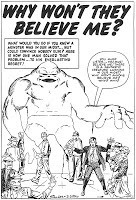 Looking on the bright side, I can envision Stan Lee, as I say, cracking the Ditko code and writing four High Iconic Ditko stories to appear in the same issue. Looking through a more jaundiced lens, Stan Lee had no idea what was going on and over a period of time just ended up with four High Iconic jobs and decided What the hey! And put them all in the same issue. The job numbers that appear on the splash pages aren’t completely sequential (V-391, V-392, V-393, V-395, V-396) but pretty close. It might be something as simple as a deadline crunch and Ditko picked out the five scripts that he thought he could draw the fastest.
Looking on the bright side, I can envision Stan Lee, as I say, cracking the Ditko code and writing four High Iconic Ditko stories to appear in the same issue. Looking through a more jaundiced lens, Stan Lee had no idea what was going on and over a period of time just ended up with four High Iconic jobs and decided What the hey! And put them all in the same issue. The job numbers that appear on the splash pages aren’t completely sequential (V-391, V-392, V-393, V-395, V-396) but pretty close. It might be something as simple as a deadline crunch and Ditko picked out the five scripts that he thought he could draw the fastest.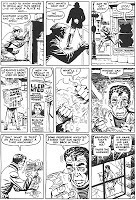 If we assume (as I do) that solo Steve Ditko is the REAL Steve Ditko, I suspect these stories gave him his first taste of iconic story-telling and told him this was where his creative heart was and where he needed to go when he opted for a smaller audience and complete creative freedom.
If we assume (as I do) that solo Steve Ditko is the REAL Steve Ditko, I suspect these stories gave him his first taste of iconic story-telling and told him this was where his creative heart was and where he needed to go when he opted for a smaller audience and complete creative freedom.“Why Won’t They Believe Me?” actually delivers the goods. Good build-up, good red herring on the second to last page and good actual twist ending. “The Last Man on Earth”, nah, “Witch Hunt”, nah, “Journey’s End” yeah.
I’ve just spent the last half hour flipping through all of them, admiring the artwork, the composition, the story-telling, the pin-stripe suits. If you’re a major league Ditko fan, you couldn’t go wrong bidding on a reading copy of AMAZING ADULT FANTASY #7 on eBay.
“Inside the Flying Saucer”
STRANGE TALES #92 (Jan 62)
Another High Iconic Ditko story. I love this one for the brush strokes that delineate the skin of the aliens. Evidently all it takes is a number four sable brush, some India ink and nerve and self-confidence like tempered steel.
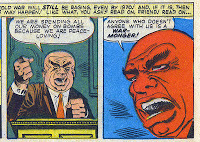 “The Ultimate Weapon”
“The Ultimate Weapon”AMAZING ADULT FANTASY #13 (June 62)
“There is a chance the Cold War will STILL be raging even by 1970” the story begins. Ditko doing his best caricature of Nikita Khrushchev: a caricature which is really the whole point of the story and which dominates most of the five pages. The shot of him on page two panel 3 certainly recalls the day when the most pressing concern for all humanity was that this hysterical lunatic had his finger on the nuclear button.
Could the United States bluff him or call his bluff? Interesting that this story came out the same year that the Kennedy Administration did just that a few months later during the Cuban Missile Crisis.
“The Most Dangerous Weapon”
TALES TO ASTONISH #46 (Aug 63)
Same basic theme but with more of a High Iconic treatment: the premise of the story is that there is a museum which houses the only weapon remaining on the face of the earth in the year 2,050 (the comma is an interesting touch).
The more unlikely the story – and what could be more unlikely than there existing only one remaining weapon on the face of the earth? -- the more Iconic the Ditko treatment so, again, everything gets stripped down to the bare essentials after pages 2 and 3 have set up the premise that the only weapon remaining on the face of the earth is about to be stolen. Pages 4 and 5 are virtually just “talking heads” and Ditko has the good sense to realize that it needs to be played that way. It’s a straightforward science fiction story with an unlikely premise that changes into a parable about the nature of power and how weapons factor into that. When Stan Lee switches from the one to the other, Ditko switches as well. There isn’t much of a message, but watching Ditko switch from straightforward narrative to Iconic narrative is worth the price of admission. He gets a lot done with just some edging of shadows once he’s dispensed with all pretence of doing backgrounds.
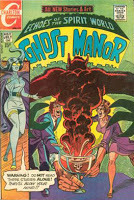 Blake also included a couple of GHOST MANOR covers (a Charlton title) one of which appears to be Wally Wood (or one of the Legion of Substitute Woods, Dan Adkins or Ralph Reese or somebody) inking Steve Ditko. Whoever it is does a pretty good job considering that you can’t really “jazz up” Steve Ditko without losing the value of it being a Steve Ditko piece. “What can I do and what can’t I do in order for this to still look as if it was done by Steve Ditko when I’m finished?”
Blake also included a couple of GHOST MANOR covers (a Charlton title) one of which appears to be Wally Wood (or one of the Legion of Substitute Woods, Dan Adkins or Ralph Reese or somebody) inking Steve Ditko. Whoever it is does a pretty good job considering that you can’t really “jazz up” Steve Ditko without losing the value of it being a Steve Ditko piece. “What can I do and what can’t I do in order for this to still look as if it was done by Steve Ditko when I’m finished?”The answers are: a) not very much and b) just about everything you can think of, respectively. The cover to issue 19 is particularly difficult since the arms of the man and woman holding the chalice are distorted dramatically, so you still have only four brush strokes (or thick speedball nib strokes) to get the man’s jacket right on an arm that’s roughly twice as long as it’s supposed to be. Yikes! It’s either Ditko inking himself or someone who guessed right on the folds and, as a result, didn’t have to worry about having to guess as accurately elsewhere.
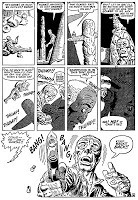 Then there’s a page from STRANGE TALES #74, pg. 4 (Apr 60) which looks like John Severin inking Ditko which (no surprise) turns out to be more John Severin than Steve Ditko.
Then there’s a page from STRANGE TALES #74, pg. 4 (Apr 60) which looks like John Severin inking Ditko which (no surprise) turns out to be more John Severin than Steve Ditko.(Ed. Blake note: Severin didn't ink this page, but Ditko was certainly studying Severin and apeing his inking style during this period, which we discuss here)
Severin is scrupulous in getting the details right – he cut his teeth on Kurtzman’s war stories where getting the details wrong was a good way to cut your own throat with Kurtzman -- so he must have blanched visibly when he saw the Steve Ditko-pencilled .45 automatic in the bottom panel. “What in the HECK is THAT supposed to be?” I can hear him saying to himself. Our best evidence suggests that Steve Ditko saw a .45 automatic once -- many, many years ago – memorized the parts he liked, reduced them to a handful of iconic Steve Ditko shapes and mannerisms and never looked at the real thing again. Didn’t really need to. An actual .45 would look as out-of-place in a Mr. A story as an actual skyscraper would in Spider-man. There are some things that Ditko makes look better than authentic and the .45 automatic is one of them (skyscrapers, too!)
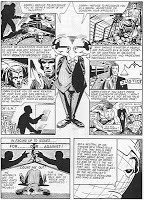 And that brings us to THE AVENGING WORLD (1969). It’s not hard to see why Steve Ditko ended up disappointing his legions of fans who assumed that he was basically in the same category as most of his contemporaries: living out the spirit of adventure he had been infected with early on in movie serials, Zorro, Tarzan, etc. Nothing wrong with doing Nikita Khrushchev as long as you make sure you have a space ship in there somewhere. I don’t know if this is why Blake sent me this one, but I commented elsewhere that – not having seen the material for close to thirty years – I was struck by Ditko’s insight and prescience in documenting “The Neutralist” (“No! I won’t stand up for or be against either side! According to my scales, I don’t see any difference between two extremes! It’s not up to me to judge which side is right or wrong! You can fight among yourselves – I’m neutral! It doesn’t affect me no matter which side has its way!”).
And that brings us to THE AVENGING WORLD (1969). It’s not hard to see why Steve Ditko ended up disappointing his legions of fans who assumed that he was basically in the same category as most of his contemporaries: living out the spirit of adventure he had been infected with early on in movie serials, Zorro, Tarzan, etc. Nothing wrong with doing Nikita Khrushchev as long as you make sure you have a space ship in there somewhere. I don’t know if this is why Blake sent me this one, but I commented elsewhere that – not having seen the material for close to thirty years – I was struck by Ditko’s insight and prescience in documenting “The Neutralist” (“No! I won’t stand up for or be against either side! According to my scales, I don’t see any difference between two extremes! It’s not up to me to judge which side is right or wrong! You can fight among yourselves – I’m neutral! It doesn’t affect me no matter which side has its way!”).To say the least, this is no way to win friends and influence people in the ultra-liberal comic-book field where the “Neutralist” is known as the “Wise Moderate”. Jules Feiffer did a less critical, more affectionate treatment of the same thing, calling it “The Radical Middle” – tweaking the lion’s whiskers rather than, like Ditko, pulling them all out in one big clump.
And, as can be seen on pages 2 and 3, he still does a great pin-striped suit.
All of this (except maybe the pin-striped suit) ties in with Ditko’s new essay -- “An Issue, Question” -- in Robin Snyder’s monthly newsletter, THE COMICS, which I’m going to be discussing somewhere up ahead on the Blog & Mail. For now, unless you’re Steve Ditko’s mother or something, that’s gotta be enough Steve Ditko for anyone.
Blake Bell's Blog
- Blake Bell's profile
- 7 followers


